INDEX
600-10x2=580px
|
2019
Links to PROGRAMS and
REPORTS
|
King
Holiday Essay — 2018 Jan 15
KC Interfaith History
Project continues February 21
Vern at Temple Israel
March
8
The Dialogue Institute
Public Service Award March 28
A Multi-Faith Lenten
Meditation April 6 -- Saturday 9 am
A Personal
Appreciation of Islam April 6 -- Saturday 11 am
Table of Faiths
Apr 30 Tuesday 5:30 - 8:30 pm
A
visit with pre-medical students private event May 1
Independence
Day Essay
"Sacred Citizenship"
from our Archives: The
America before Trump (2-page PDF)
KC Interfaith
History published
Vern learns how
to teach "Godly Play"
One God?
Comparing
the great Monotheistic Faiths 2019 Sept 23 Monday 1 pm
Ram Dass
Movie Premiere -- new date to be announced
Healing Religious
Bias — 2019 Oct 16 Wednesday 8:30-10:30 am
Vedanta hosts
Philip
Goldberg 2019 Oct 26 Saturday 10:30 am
Annual Interfaith
Thanksgiving Dinner -- 2019 Nov 10 Sunday 4:30
with the Vern
Barnet Interfaith Service Award
given to The
Peace Pavilion. Event sponsored by the HeartlandADL
Jerusalem Farm
Benefit 2019 Nov 23 Sat 7:30 pm
St Mary's Episcopal Church
Our Friend Al
Brooks Kansas Citian of the Year 2019 Nov 26
Christmas Concert
Dec 23 Mon 7 pm Beau Bledsoe and Mary Jamerson
|
2019
PROGRAMS -- REPORTS -- DETAILS
|
We expect to complete a final first edit of theAl
Brooks memoir this year.
King
Holiday Essay — 2018 Jan 15
Download a PDF of Vern's
2-page summary of the genius of the spiritual approach of Martin Luther
King Jr by clicking this link.
Ministry in
a Pluralistic World — syllabus
2019 Jan 7 – Mar 25 —
Mondays 6-9:45pm CT
2019 May 7 - July 23 Tuesdays
6-9:45pm CDT
The graduate credit course
C-RP511 is held remotely via Zoom and at
Central
Seminary 6601 Monticello Road, Shawnee, KS 6226-3513.
The course, led by Dr Vern Barnet, explores these
questions:
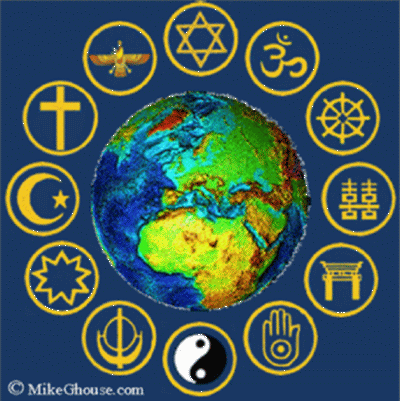 A.
DISCOVERING PRESUPPOSITIONS ABOUT OTHER FAITHS -- AND OUR OWN A.
DISCOVERING PRESUPPOSITIONS ABOUT OTHER FAITHS -- AND OUR OWN
0. Getting acquainted:
Our backgrounds, travel and other experiences, and perspectives as we approach
this course.
1. What meanings do terms
such as belief, dialogue, epiphany, holistic, mission, myth, pilgrimage,
religion, ritual, sacred, sacrifice, scripture, secular, spirituality,
and
worship, have for us and today’s society?
2. What attitudes have
scholars identified as ways folks approach faith perspectives other than
their own?
3. What does “pluralism”
mean? What are its theoretical, practical, and personal meanings? How does
it apply to the local community and the “global village”?
4. Where are we aided
and challenged by other traditions? How might our own and other traditions
address environmental, personal, and social disorders?
B. LEARNING ABOUT OTHER
FAITHS
1. How do sociological,
historical, phenomenological, and other methods of studying religions differ,
and how do they help us understand another’s faith?
2. What are the basic
structures, texts, facts, practices, and variations of other faiths?
3. How do faiths compare
and contrast?
4. What is more, and what
is less, useful for each of us today?
C. ENCOUNTERING FOLKS OF
DIFFERENT RELIGIONS
1. What are the basic
styles and purposes of interfaith engagement? What are the significant
interfaith organizations and programs affecting the student’s community?
2. How do I discover my
community’s faith complexion and my opportunities within it?
3. What issues with boundaries
arise and how can they be negotiated?
4. What do we learn about
ourselves as we learn about others? Can I be committed to my own faith
and respectful and open to others? If so or if not, what does that mean
for my ministry?
#History
KC Interfaith History Project continues . . . .
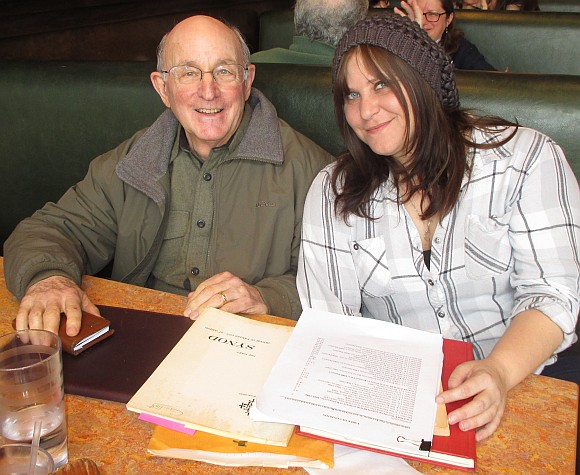
Former CRES Board chair Larry Guillot and former
CRES intern, now CRES historian, Geneva Blackmer met with Vern for lunch
Febuary 21 to review progress and plan next steps. Geneva, with both her
interfaith experience and library skills, has scoured local and state archives,
interviewed folks, and drafted what is even at this stage by far the most
complete look at how ecumenical and interfaith activities have developed
in the KC region, but the work is ongoing. Visit the KC
Interfaith History Project.
#190308
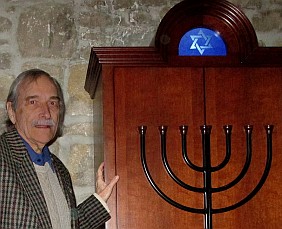 Vern
preached on What Judaism Offers a World of Diversity at Temple
Israel for the March 8 Friday 6 pm Shabbat service with a splendid
potluck following. He argued that interfaith relations are important, and
cited the special role of Judaism in the recovery of a sense of the sacred
in our desacralized global culture. The tradition's emphasis on rules by
which human relationships can best be respected (such as the Decalogue),
by its understanding of a covenantal relation with the divine and within
the community, and the significance of historical (social and political)
processes are distinctive and yet universal in their application, and underlie
much of Western culture. Vern
preached on What Judaism Offers a World of Diversity at Temple
Israel for the March 8 Friday 6 pm Shabbat service with a splendid
potluck following. He argued that interfaith relations are important, and
cited the special role of Judaism in the recovery of a sense of the sacred
in our desacralized global culture. The tradition's emphasis on rules by
which human relationships can best be respected (such as the Decalogue),
by its understanding of a covenantal relation with the divine and within
the community, and the significance of historical (social and political)
processes are distinctive and yet universal in their application, and underlie
much of Western culture.
Temple Israel enjoys interfaith
arrangements with Rolling Hills Presbyterian Church at 9300 Nall Ave, Overland
Park, which hosts the congregation. Rabbi
Jacques Cukierkorn has befriended Vern on many occasions. Rabbi and
Bill Tammeus wrote They Were Just People: Stories of Rescue in Poland
During the Holocaust, and Rabbi has written several other books, including
the wonderfully informative Accessible Judaism: A Concise Guide to Judaism.
#190328
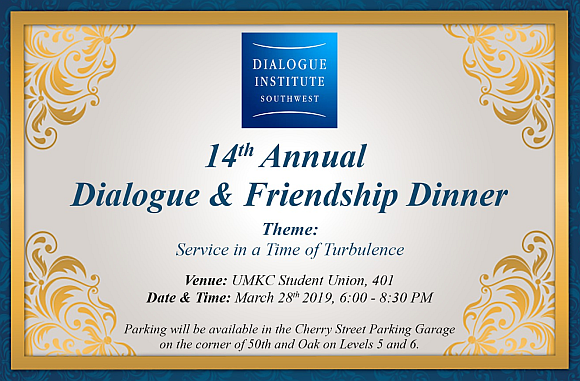
CRES minister
emeritus, the Rev Vern Barnet, DMn,
received the
Dialogue Institute
Public Service Award 2019 March
28.
The honor was given as part of the 14th annual Dialogue
and Friendship Dinner, this year with a theme of "Service in a Time of
Turbulence." The keynote speaker was Sophia
Pandya, PhD. About 320 people attended. The Hon
Ed Eilert, chairman of the Johnson County Commission, is chairman
of the Host Committee which includes the Hon Peggy Dunn, Mayor of Leawood;
Ron
Slepitza,
President of Avila University; Joseph Sopcich,
President
of Johnson County Community College; the Rev William B Rose-Heim, Regional
Minister and President, Christian Churches (Disciples of Christ) of Greater
Kansas City; Calvin Hayden, Johnson County Sheriff; and Jude
Huntz,Faith Director, Habitat for Humanity.
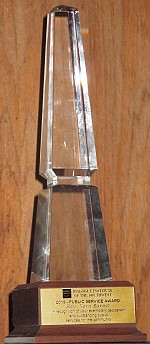 Dr
Barnet gave the invocation at the 2017
dinner. You can read it here.
Vern has been friends with the folks of the Dialogue Group for many years.
In 2005 he was part of a US group traveling in Turkey hosted by the Gulen
Hizmet Movement which our keynote speaker has studied. Dr
Barnet gave the invocation at the 2017
dinner. You can read it here.
Vern has been friends with the folks of the Dialogue Group for many years.
In 2005 he was part of a US group traveling in Turkey hosted by the Gulen
Hizmet Movement which our keynote speaker has studied.
Dr Barnet
founded CRES in 1982 and the Greater Kansas City Interfaith Council in
1989 as a program of CRES. His 947 weekly columns
ran in The Kansas City Star for 18 years. The recipient of many religious
and civic awards for his work building understanding among peoples of all
faiths, he was one of a team of four producing the 740-page reference book,
The
Essential Guide to Religious Traditions and Spirituality for Health Care
Providers, published internationally (2014). His book of 154 sonnets,
Thanks
for Noticing: The Interpretation of Desire (2015), is heavily annotated
to identify themes from world religions. Professor Barnet has taught as
an adjuct at several universities and theological schools; he currently
teaches "Ministry in a Pluralistic World"
at Central Baptist Theological Seminary. A full bio sketch can be found
at www.cres.org/vern. A 2-minute
video of Vern interviewed by folks from the Fethullah Gulen Movement asking
about why he is involved with interfaith work appears on YouTube. |
ACCEPTANCE REMARKS
Friends of the Dialogue Institute,
my colleague David Nelson, CRES board chairs Joe Archias, Larry Guillot,
David Stallings, friends of Grace and Holy Trinity Cathedral, and other
new and old friends:
Thank you for
building interfaith friendships, rejoicing in differences as gifts to one
another. This is the first step in this time of turbulence to contain the
raging fires of our desacralized age.
Now from the Primal faiths
we must learn the wisdom to save our environment, from Asian faiths the
wisdom to make the self whole again, and from the faiths of Monotheism
the wisdom to heal broken community.
Again, thank you. |
The award reads
DIALOGUE INSTITUTE OF THE
SOUTHWEST
2019 - Public Service
Award
[The] Rev Vern Barnet
in recognition of your exemplary
dedication
and outstanding public services
for the community
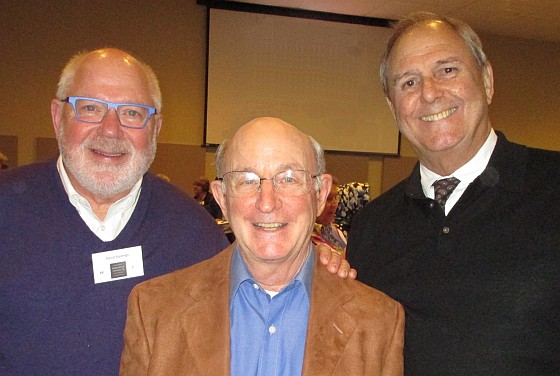
Three CRES board chairmen cheered Vern on: David
Stallings who reorganized CRES governance, immediate past chairman
Larry
Guillot, and long-serving current chairman Joe Archias. Vern
is very grateful to all three for their support and encouragement over
the decades, and to know them as extraordinary friends.
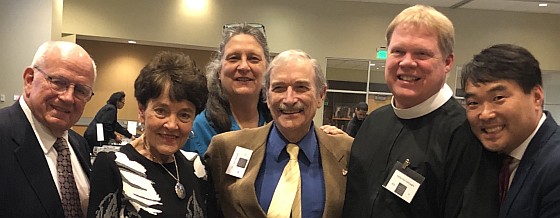 Some of the friends from the Grace and Holy Trinity
Cathedral table greeted Vern for this photo after the dinner -- Jim
Royer and Donna Knoell,
Kari O'Rourke, Vern, and the
Rev Ron Verhaeghe and
Jeffrey Bennett.
Some of the friends from the Grace and Holy Trinity
Cathedral table greeted Vern for this photo after the dinner -- Jim
Royer and Donna Knoell,
Kari O'Rourke, Vern, and the
Rev Ron Verhaeghe and
Jeffrey Bennett.
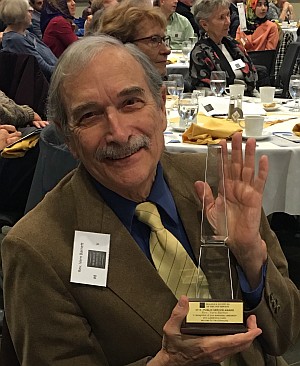
The MC for the evening was the Rev Kelly Isola,
chair of the Greater Kansas City Interfaith Council who graciously introduced
Vern and outlined his presence in the community. As the chair of the Council,
which Vern founded in 1989, Kelly said that she was standing on Vern's
shoulders, a way of reminding us that we build on the work of others who
have gone before us.
The invocation was given
by the spiritual leader of Congregation Kol Ami, Rabbi Doug Alpert,
whom Vern has long admired for his leadership in social justice issues.
The award was presented
by the Hon Peggy Dunn, Mayor of Leawood, who is faithful in so many ways
over so many years to the message of interfaith understanding.
One of the other award
recipients was Clare Stern, Executive Director of the KC Interfaith Youth
Alliance.
#190406
 Vern
spoke April 6 Saturday at 9 for Vern
spoke April 6 Saturday at 9 for
the Unity Church of Overland Park Men's Group at
the Main Johnson County Library nearby at 9875 W 87th, following breakfast
at the Santa Fe Cafe, 9946 W 87th.
A Multi-faith
Lenten Meditation
Lent
is a season in the Christian liturgical calendar for self-examination as
preparation for Holy Week's commemoration of the suffering and crucifixion
of the God-Man Jesus, leading to Easter. Some observe Lent by abstaining
from certain foods or other enjoyments. (The word "Lent" seems to derive
from the lengthening sunlight in the days leading to spring.) But religions
other than Christianity may also have periods of introspection and self-denial.
How have various faiths understood suffering as a redemptive experience?
How can their insights enrich our lives in today's desacralized world?
Vern said that the Christian
story of crucifixion of Jesus has been construed throughout history and
still today in ways that are unhealthy.
How are we benefited by
the sacrifice in the Christian narrative? To explore this question, Vern
discussed merited and unmerited suffering in the Hebrew canon (the "Old
Testament"), in Islam (such as fasting during Ramadan), and in Buddhism
(by telling the story of the Vimalakirti Sutra). He also mentioned the
benefits we receive from the unmerited suffering from figures like Gandhi,
Mandela, and King.
In Kansas City, the murders
of three people thought to be Jewish April 13, 2014, led Mindy Corporon
-- who did not deserve to lose her father and son in those horrid,
hateful, and ignorant crimes -- to found the SevenDays
organization to reduce prejudice and grow understanding.
Better than the ideas
of Origen, Augustine, and Anselm -- figures who explained the benefit of
the death of Jesus as satisfying the demands of God for someone to pay
the penalty for all our sins -- is the approach of those like Abelard who
understood Jesus as an example of living one's life with integrity, despite
the cost.
#190406Islam
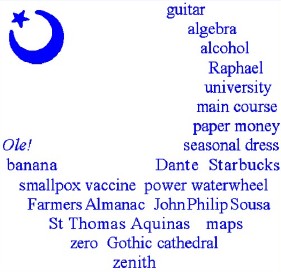 A
Personal Appreciation A
Personal Appreciation
of Islam
by a Christian
Scholar
While our culture's debt to
Islam is great but seldom acknowledged, the theological treasures of the
faith are even greater. However, the widespread misunderstanding of the
tradition, and its misuse by some of those claiming it, sometimes make
it difficult to appreciate. Vern discussed how his own life and our culture
have been enriched by the Muslim faith.
The remarks April 6 Saturday at 11 am followed a 10:30 brunch at the Dialogue
Institute, 2710 S 42, Kansas City, KS 66106, where Vern has been the
speaker twice before. A 2-minute video of Vern interviewed by folks
from the Fethullah Gulen Movement asking about why he is involved with
interfaith work appears on YouTube.
Vern prepared the following
quiz to initiate the discussion. Answers here.
Vern asks what this number
is. No one was able to say immediately. It is 1492, the year Columbus "discovered"
the New World, but also the year of the Reconquista, which led to Christians
to expell Jews and Muslims from their homes then in what is now Spain and
Portugal. Would you like to use these Roman numerals or Arabic numerals
in calculating your income tax? We benefit from Muslim culture in countless
ways but seldom recognize it.
What do
you know about Islam?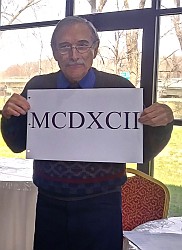
1. T/F — The three largest world faiths are, in order, Christianity, Islam,
and Judaism.
2. T/F — Well over ten per cent of American Muslims are African-American.
3. T/F — American colonies were formed by those escaping religious persecution
in Europe who then offered religious liberty to those who settled here.
4. T/F — Muslims lived in South Carolina by 1790.
5. T/F — Jesus (pbuh) is mentioned more times in the Qu’an than Muhammad
(pbuh).
6. A/B/C — the KC area offers (a) one mosque (b) three mosques, (c)
more than ten.
7. T/F Thomas Jefferson, who wrote the Declaration of Independence,
advocated religious rights for the “Mahamdan,” the Jew, and the “pagan.”
8. T/F — Jesus or Christianity is mentioned in the Declaration of Independence
three times and in the Constitution twice.
9. T/F — Muslim slaves are buried in New York near the site of the 9/11
attacks.
10. T/F — By 1919, a mosque had been built in Michigan, by 1934 in
Iowa, by 1957 in Washington, D.C., and in Kansas City by 1981.
11. T/F — The Muslim Student Association (UMKC’s chapter formed by 1984),
with other groups, led to the founding of the Islamic Society of
North America (ISNA).
12. T/F — The Jackson County Diversity Task force including Jewish, Muslim,
Christian, and Buddhist members, formed after the 9/11 attacks to survey
the 5-county area, presented a 77-page report with three pages of recommendations
to the community on Sept 10, 2002.
13. T/F — A Socialist wrote the Pledge of Allegiance to the United States
in 1892, but the words “under God” were not added until 1954.
14. T/F — In 1783, the president of Yale College, Ezra Stiles, cited
a study showing that “Mohammadan” morals
were “far superior
to the Christian.”
15. T/F — In 1953, the US and Britain staged a coup d’?tat to oust the
democratically chosen popular prime minister Mohammad Mosaddegh and supported
the cruel and dictatorial Shah Mohammad Reza Pahlavi.
16. T/F — The first nation to recognize the July 4, 1776 independence of
the United States of America was a Muslim country, Morocco, in 1777.
|
 Vern
honored with "Pioneer" award at the Vern
honored with "Pioneer" award at the
Annual TABLE
OF FAITHS
2019 Apr 30 Tuesday 5:30
- 8:30 pm
The 30th anniversary of the
founding of
The Greater Kansas City Interfaith
Council,
now independent but originally
a program of CRES.
Vern Barnet, who founded in the Council
in 1989, offered greetings, congratulations, and thoughts
about this year's theme,
Honoring in Sacred in
All. Congratulations also to Bill Tammeus on receiving
the Steve Jeffers Leadership Service Award for his significant voice in
religious journalism and community service, and who received the CRES award
in 2001 for "work over many years in recognizing the importance of religion
and by writing about matters of faith with knowledge and passion," and
to the Crescent Peace Society on this wonderful Muslim interfaith
organization receiving the Table of Faiths Award. Vern, who is Council
Convener Emeritus, received the first award from Mayor Kay Barnes in 2005,
and is pleased also to have been a part of creating the CPS. The Council
newsletter has published his brief notes about three
milestones in the early history of the Council.
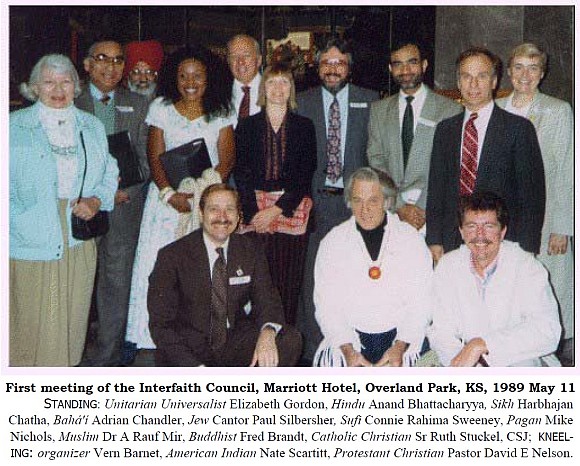
The evening's MC was the Rev Kelly Isola, chair
of the Council, who skillfully shaped the evening's program. After the
awards, she introduced Vern. Vern, who had previously reviewed highlights
of the Council's early history with slides at its April monthly meeting,
instead this evening focused particularly on the wisdom from the 2001 Gifts
of Pluralism conference.
After Vern's remarks,
he was surprised with special award to him from the Council. Larry Guillot
cited Vern's background and initiation of a number of programs, and the
Council itself in 1989, and presented him with the "Interfaith Pioneer"
award. Vern thanked Larry for his extraordinarily generous remarks
and saluted the Council for its 30 years of promoting interfaith understanding.
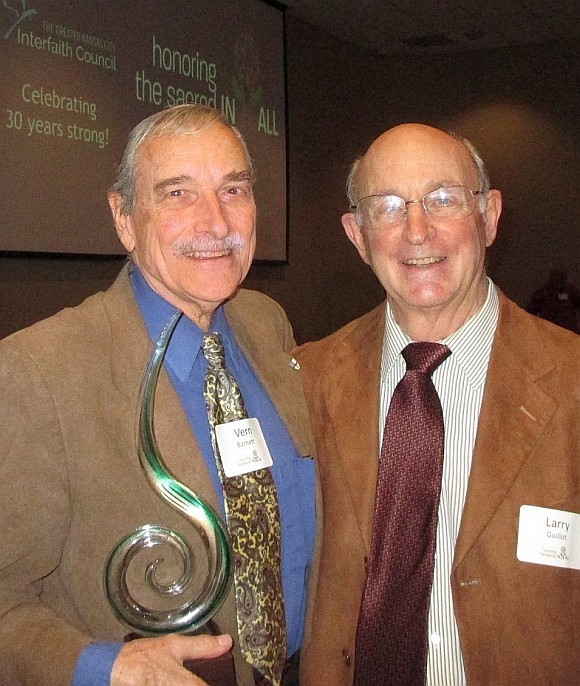
#ToFRemarks
[this text includes some expansions]
Noting the evening's theme, Vern said that he tells
his students, "if you want to understand others' faiths, don’t ask them
what they believe; ask them what is sacred to them." He then offered some
descriptions of the sacred --
:: the sacred is what fills you with awe.
:: the sacred is what is most meaningful to you.
:: the sacred is what you’d give your life for.
:: the sacred is sensed when you are "with the flow"
:: the sacred points to ultimate worth, giving your life has purpose and direction.
:: the sacred is what really counts.
:: the sacred is what Joseph Campbell calls "the rapture of being alive."
:: the sacred appears when you are most glad to be alive.
:: the sacred comes with the unanswerable questions like Why is there something rather than nothing?
:: the sacred is what creates the Agenda.
:: the sacred produces an "oceanic feeling."
:: the sacred appears as a numinous darkness or radiance or presence; perhaps as one encounters mysterium tremendum et fascinans (Rudolf Otto).
::
the sacred is reported in classic stories such as the bush that burns
but is not consumed which Moses encounters (Exodus 3), the vision of
Isaiah (chapter 6), the voice in the whirlwind (Job 38), Elijah
hearing the still small voice (1 Kings 19:11-13),
Julian of Norwich seeing the world in a nutshell, the form of Krishna as the Universal Deity manifested to Arjuna
(Gita, chapter 11), the awakening of the Buddha under the Bo Tree, Israʾ (the Night Journey of the Prophet Muhammad, pbuh -- Qurʾān 17:1), and so forth.
:: One of the most stunning (and scandalous) representations in Roman Catholic (Christian) art is Bernini's Ecstasy of St Teresa
in the Cornaro Chapel of the church of Santa Maria della Vittoria in
Rome. An infinitely more quiet manifestation of the sacred is the rock
garden at Ryōan-ji in Kyoto, Japan, of the Myōshin-ji school of the
Rinzai branch of Zen (Buddhism). Surely one of the most stupendous
monuments to the sacred in India, at Ellora, is the Kailāśanātha temple
(Hindu). The colossal Buddhist site at Borobudur, Java, enacts the path
to Enlightenment. The Intihuatana at Machu Picchu, Peru, is a
cosmic recognition of our dependence on, and ordering by, the sacred.
Perhaps one of the most awe-inducing places in nature anywhere in the
world is the Grand Canyon in Arizona, USA (the Pueblo peoples regarded it as holy land). But the sacred can be found anywhere if one's eyes are fully open."Think of a time when you encountered the sacred
in nature, in yourself, or in community. -- Maybe the evening moon on the
waves of the ocean; maybe when you had a hard decision to make, a sudden
insight; maybe when you experienced solidarity when you marched for civil
rights or to walked from mosque to synagogue to church to demonstrate the
fabric of love in our community."
He then asked folks to
find a partner or two at their tables to share what had come to mind about
an experience of awe and wonder, the sacred . . . .
In his remarks, Vern praised
the 2001 “Gifts of Pluralism” Concluding Conference Declaration (unanimously-approved)
which set forth this wisdom:
*
In Primal faiths we find ecological awe: nature is respected more than
controlled; nature is a process which includes us, not a product external
to us to be used or disposed of. Our proper attitude toward nature is wonder,
not consumption. Our lives depend on nature.
* Asian religions generally find the sacred in personhood as our actions
proceed spontaneously and responsibly from duty and compassion, without
ultimate attachment to their results.
* In Monotheistic traditions, the awesome work of God is manifest in history’s
flow toward justice when peoples are governed less by profit and winning
and more by the covenant of service. Our lives depend on community.
As an example of this
wisdom, he outlined an American Indian (“Primal”) understanding of the
sacred found in nature with a couple of stories and then said—
#oil
Those
with personhood corrupted by greed and other base desires deny climate
change to profit from certain industries perverting the governance of the
community and the holiness of the planet.
Our culture’s desecration of nature is not new. If it didn’t begin in 1620
with Francis Bacon’s natura vexata — vexing nature, controlling
nature, to our own desires rather than respecting all things that compose
our environment, it surely was not corrected by René Descartes’
1637 discovery that only humans had souls, that animals were merely machines
cleverly disguised by God to appear to experience pain, but really, just
machines with no feelings.
But violating the sacred sphere of nature also profanes the other two realms
in which the sacred is found, personhood and society, because all things
interpenetrate.
One quick example to suggest the interconnections: Oil.
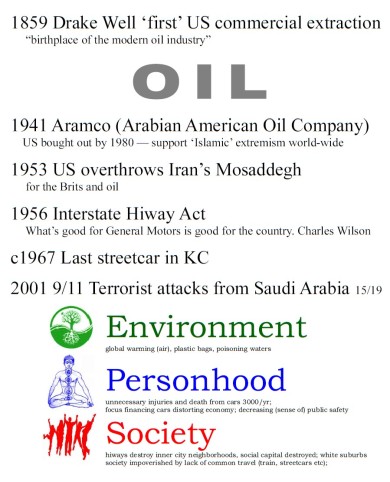
A good man benighted like most of us, Charles Wilson, the head of General
Motors, concerned to sell cars, chosen as Secretary of Defense, helped
plan the so-called Defense Highway Act, which gave us what we call the
Interstate. I'm old enough to remember: “What’s good for General Motors
is good for the country.” By the government turning from public transportation
to subsidizing the oil industries, our greenhouse gases contribute to global
warming.
Nature violated.
The social order is violated because our oil purchases from Saudi
Arabia prop up the very nation that produced most of the 9/11 terrorists,
one of the most horrific attacks against social order as well as 3000 immediate
violations of personhood and millions of collateral injuries and
deaths, not to mention the psychological trauma and poisoning from the extraction process afflicting so many.
Let me mention one person in particular. Saudi Arabia for decades
has, around the world, advanced the most intolerant approach to faith.
Now its corrupt monarchy has murdered -- sawed up his body -- the American-based
journalist Jamal Khashoggi.
One other
quick oil example. Since the US and Britain felt entitled to Iran’s oil,
we overthrew the democratically elected government of Mohammad Mosaddegh
of Iran in the 1953 coup d'état, and installed the corrupt and vicious
dictator, the Shah Mohammad Reza Pahlavi who the people understandably
overthrew in 1979. Even though it is a far more democratic state than Saudi
Arabia, the history between our counties has been spoiled by oil. This lampoon overstates how oil corrupts US foreign policy, but only by a measure.
Our unreasonable thirst for oil not only violates nature but also violates
personhood and corrupts politics. Desecrating one sphere of the sacred
violates them all.
The Interstate Highway System is part of American structural racism. Its
construction purposely often went through, and destroyed, poor, Black communities.
Families and businesses forced to move were often unfairly compensated
and the "social capital" of urban neighborhoods destroyed, a factor leading
to various forms of disorder.
Let’s stake a step back and look at the evil of slavery. Thomas Jefferson
was troubled by slavery, and maybe he really loved Sally Hemmings. While
he freed all the Hemmings children, other slaves were not freed. The culture
of the time and place supported slavery. People depended on the “peculiar
institution” even though it violated sacred
personhood. Now people love their private cars. Our economy now depends
on private transportation, even though the private fleet violates the environment
and the profanes the future of the planet. Not to mention plastics derived
from oil. It took a civil war to be rid of slavery, and even now the dignity
of personhood is threatened. Will we reform culture and public policy to
remove the antibodies of unnecessary vehicles and the cancer on the land
of metastasized highways and redeem the environment?
Oil is a pervasive problem illustrating how
environmental, personal, and social crises of our time are interlaced.
We are doomed unless we move from the Enlightenment/Modernist growth
mentality of "progress" to ways of sustainability through the
realization of the Sacred which leads to gratitude rather than
accumulation through destruction.
Yep, Francis Bacon, the Enlightenment, and its colonization vexed nature. And so much more.
He concluded with a story with
the paradoxical truths than the sacred can be found in every tradition,
and that the treasure to end our spiritual povery can be found in our time
by encountering and learning from the sacred in other faiths.
A short overview of the
three families of faith as cures to our environmental, personal, and social
crises can be downloaded here.
As a historical note, we list
the leaders of the Council since its status as a program of CRES when Vern
had led it fifteen years, 1989-2004: the Rev David Nelson, DMin; the Rev
Kathy Riegelman; Robert Bacic; Sheila Sonnenschein; the Rev Mary Gibson
McCoy; the Rev Kelly Isola. [Subsequently, leadership has passed to Cindy McDavitt.]
Vern visits
with pre-medical students
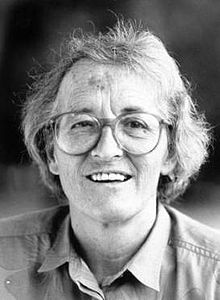 As
one of the four editors of The
Essential Guide to Religious Traditions and Spirituality for Health Care
Providers, Vern had a delightful informal discussion about spirituality
in health care with a dozen local pre-med students at breakfast. He began
by telling about his teacher at the University of Chicago Hospitals during
chaplaincy training, Elisabeth
Kübler-Ross, who is credited for developing the study of dying patients.
Vern described her interviews on one-side of a reciprocal mirror, followed
by a discussion with her students on the other side. Her first question
always was, "What was your gut-reaction?" She was concerned that until
students were aware of, and could process, how they felt, their view of
the patient would be clouded by unacknowledged personal filters. As
one of the four editors of The
Essential Guide to Religious Traditions and Spirituality for Health Care
Providers, Vern had a delightful informal discussion about spirituality
in health care with a dozen local pre-med students at breakfast. He began
by telling about his teacher at the University of Chicago Hospitals during
chaplaincy training, Elisabeth
Kübler-Ross, who is credited for developing the study of dying patients.
Vern described her interviews on one-side of a reciprocal mirror, followed
by a discussion with her students on the other side. Her first question
always was, "What was your gut-reaction?" She was concerned that until
students were aware of, and could process, how they felt, their view of
the patient would be clouded by unacknowledged personal filters.
So Vern asked each of
the students what "spirituality" meant to them. One student's response
included his belief that everything happens for a reason. Later, without
directly speaking to that student, Vern noted the value of being aware
of such a personally held viewpoint in order not to assume that the patient
had a similar viewpoint and in fact might need to feel otherwise in order
to be supported in the process of healing.
Vern outlined the sacred
in "three families of faith"
and told of how the understanding of the sacred in nature became critical
for an American Indian in a Pennsylvania hospital who could not access
the healing rites of a Navajo sand painting chantway, and how it was resolved.
Students asked some wonderful
questions, such as How can you both be detached from a patient in order
to see the patient's needs clearly aside from your own on one hand, and
on the other, enter into the patient's experience in such a way as the
patient knows you understand and deeply care?
#historypublished
 Bill
Tammeus writes July 25 in his “Faith
Matters”
blog about Geneva Blackmer’s book, The Ecumenical and Interfaith
History of Greater Kansas City. Bill
Tammeus writes July 25 in his “Faith
Matters”
blog about Geneva Blackmer’s book, The Ecumenical and Interfaith
History of Greater Kansas City.
Bill says, “As Blackmer,
a 2016-'17 intern for the Center for Religious Experience and Study who
recently accepted a position as program director for the Interfaith Center
at Miami University in Oxford, Ohio, notes, ‘If it was ever necessary to
designate one city in the United States as the heart of interfaith activity,
a very compelling argument could be made for Kansas City.’
“The booklet is itself
an argument for that contention.”
After several paragraphs
discussing some of the content of the book and mentioning several important
interfaith organizations, he concludes, “There is, of course, still much
to be done to reach the Interfaith Council’s goal of making KC the most
religiously welcoming community in the country. But Blackmer’s work is
a tribute to how much effort already has gone into achieving that goal.”
Surely Bill himself is
one reason that Kansas City has been more welcoming to interfaith efforts
than some places, and Geneva’s outline of Kansas City’s progress can inspire
us to move forward.
Geneva is shown above
in a February review session with Larry Guillot who was one of her advisors
on the book project.
Vern says, “Geneva was
one of the best things ever to happen to CRES, to interfaith progress in
Kansas City, and to me. Her initiative, energy, faithfulness, many diverse
skills, and academic competence made her a cherished laborer in the interfaith
field here, and — as I know from all the requests for references I’ve received
around the country — a much sought-after leader into the future.”
#190824
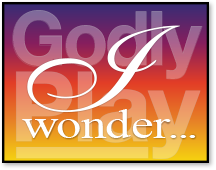 Vern,
who has been teaching 3 to 5-year olds for several years at the church
he attends, completed a regional "Godly Play Core Training" August 22-24
with a group of nine other learners and two trainers. "While I have always
been in accord with Godly Play's approach to respecting and supporting
children's own experience, I learned to be a much better teacher by understanding
the Montessori-influenced methods and the extraordinary curriculum materials
and physical arrangements more fully," Vern says. Vern,
who has been teaching 3 to 5-year olds for several years at the church
he attends, completed a regional "Godly Play Core Training" August 22-24
with a group of nine other learners and two trainers. "While I have always
been in accord with Godly Play's approach to respecting and supporting
children's own experience, I learned to be a much better teacher by understanding
the Montessori-influenced methods and the extraordinary curriculum materials
and physical arrangements more fully," Vern says.
"But
I was quite intimidated by my 'classmates' who learned their assigned stories
and told them well. I was fatigued going into the training and had difficulty
learning my story with the accompanying materials. Even though I loved
the lesson, and even with insights from a couple classmates who helped
me rehearse, I was prepared only to embarrass myself. I had always told
Godly Play stories with notes at hand if I needed them and always sought
to engage the children by making eye contact with them throughout the story.
"Now I was being asked
to tell a story without notes, using the materials (in this case, two candles,
matches, two plaques, an unrolling underlay, simple carved unpainted wood
images of Mary, Joseph, a donkey, and a model of Bethlehem) and get the
timing of using the materials with the story text right. The words are
wonderfully sequenced and crafted and echo throughout the curriculum. Even
more unnerving was not looking up (at the children; in this case, my classmates).
"After lunch on the last
day, I could not postpone my turn much longer, so I began.
"It was not until the
training ended, the morning after, waking with a start at 4 am, that I
realized what had happened when I told my story. From the first phrase
of the story, 'Everything is changed,' to the end, I was in a sort of trance
broken only slightly one time when I, for split second, asked myself, 'What
comes next?' and one other time when I realized I had left out one part
and then effortlessly added it back in, even if it was in the wrong place.
Almost all that time there was simply the story. I was pretty much not
there. It was the story telling itself. When the story ended, the trainer
caught my attention and then I also saw the others in the room generously
approving of my imperfect effort; it was like waking up.
"I realize now more deeply
that by inviting the children to focus on the story rather than on the
story-teller, without even our implied interpretations, we can offer to
children the experience of stories that open into the sacred, the realm
of wonder, the source of life's meaning."
#190923
One God?
Comparing the great Monotheistic
Faiths
2019 Sept 23 Monday 1 pm, Lakeview Village, Lenexa
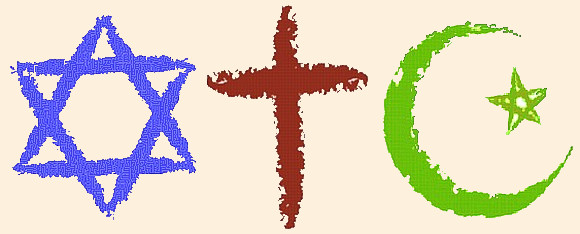
In this interactive program, Vern discussed how
Monotheistic religions arose, how they compare and contrast, how they differ
from Primal and Asian Faiths, and how Zoroastrianism influenced Judaism,
Christianity and Islam, themselves generating additional faiths like Bah?'?
and Sikhism, and movements like Marxism. Below Lakeview chaplain Quentin
Jones introduces Vern for the afternoon session and announces that over
a hundred residents had registered for the event.
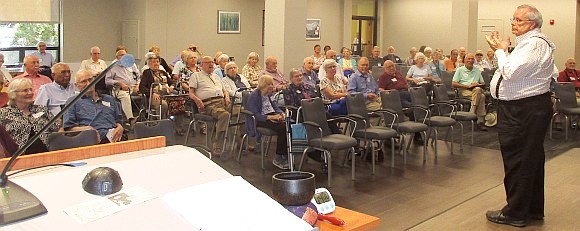
In order to present what monotheistic religions
have in common, Vern distinguished them from Primal and Asian faiths in
several ways, particularly by contrasting the monotheistic purposive "straight-line"
view of time with the circular playful (lila) view in, for example,
Hinduism.
The commonalities identified include --
1. a focus on historical events and processes
1a. (governed by a single supreme power -- "God")
2. and specifically singular events around which
the faiths pivot, with
3. concern about the disjunction between God's
will and the existing social order.
4. These religions all have authoritative written
sacred texts.
5. They involve a covenant or relationship between
God and a special people.
6. They are eschatological and incipiently dualistic
with figures like Satan
7. Mysticism, while present, is not normative.
Marxism was placed in the monotheistic family (along
with Bah?'? and Sikhism) even though some forms of Marxism are atheistic
("economic determinism" is a functional equivalent of God).
In order to clarify how different religions emphasize
different dimensions of religion (the 4 C's: creed, code, cultus,
community), participants were invited to make pie charts allocating
their perceptions of the three main monotheistic faiths, Judaism, Christianity,
and Islam, and a pie chart for one's own present world view or religion.
Vern also offered other caveats about the study of religion. During the
course of the presentation, two quizes led to interesting exchanges in
small groups.
For a free copy of printed materials distributed
to the audience, send a self-addressed stamped envelope to Monotheism,
Box 45414, KCMO 64171. For a background overview (not presented on this
occasion) of world religions and the crises of the environment, personhood,
and society, download this PDF:
The Gifts of Pluralism:
Awe is the Cure.pdf .
#190927
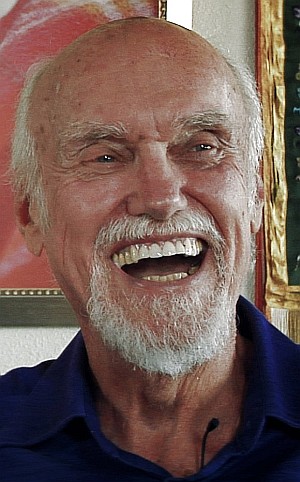 Becoming
Nobody Becoming
Nobody
Ram Dass
Movie Premiere
postponed -- expect new date soon
Additional shows: expect new dates
soon
Unity Temple on the Plaza
Enjoy this new cinema portrait of a beloved icon's
life and teachings. BECOMING NOBODY follows the fascinating journey of
Ram Dass — the world renowned sage and guru whose vision transformed hippie
America — from his early years as a rock star Harvard psychologist and
LSD pioneer to an Eastern holy man who encouraged the world to “be here
now.” Dass’s teachings — shedding one’s ego and one’s sense of self,
becoming “one with the universe” — have defined a generation of truth-seekers.
His wisdom flows out of this quintessential film portrait, and you are
sure to leave this experience with more compassion, and more attentiveness
to the moment, than when you arrived.
Historic clips balance an engaging conversation
with director Jamie Catto. We come to understand how encrusted roles and
habitual disguises become increasingly burdensome. The film captures a
loving man full of joy, wit, honesty, and wisdom, at ease in conversation
while sharing his considerable pains and pleasures. The life experiences
that have freed him from the attachments of his ‘somebody-ness’ have transformed
him into the radiant soul who now inspires a new generation.
WATCH PREVIEW ? ORDER ADVANCED TICKETS at www.KCFilmForum.com
Presented by the KC Film Forum and co-hosted by
CRES, the Open Circle Spiritual Cinema Series, and the Temple Buddhist
Center.
#191016
Healing Religious Bias
2019 Oct 16 Wednesday 8:30-10:30
am
Metropolitan Community College -
Penn Valley
3201 SW Trafficwav, Kansas City,
MO 64111, Room EC19
CPE - Continuing Professional and Education credit
through UMKC
Registration: http://www.culturalcollectivekc.org/NewsandEvents
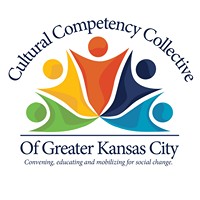 Vern
engaged with the Cultural Competency Collective of Greater Kansas City
whose "mission is to create a sustainable community process to provide
culturally appropriate care and reduce disparities in service to clients,
students and peers. CCCofGKC members are largely human service providers
– mental health, behavioral health, social welfare, education and more." Vern
engaged with the Cultural Competency Collective of Greater Kansas City
whose "mission is to create a sustainable community process to provide
culturally appropriate care and reduce disparities in service to clients,
students and peers. CCCofGKC members are largely human service providers
– mental health, behavioral health, social welfare, education and more."
Vern opened with a quiz
(a copy of which you may have by mailing us with a stampt, self-addressed
envelope), provided an overview of world religions with an interactive,
small group process, and offered guidelines and practice for overcoming
bias (hint: differences are gifts, not threats).
Our community and the
world can be healed from its religious prejudice and fragmentation by learning
how to talk with others about their faith perspectives as we work to heal
the environmental, personal, and social crises of our time. This session
offered information, theory, and practice.
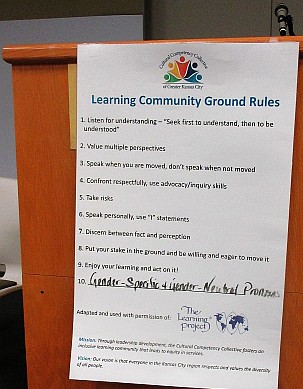
Posted on the unused lectern
(Vern works from the floor with participants in chairs in a circle in small
groups (no tables), was the Ground Rules developed by Maggie Finefrock,
president of The Learning Project. CRES also claims her as our Chief Learning
Officer. The organization's session leader reviewed the rules before introducing
Vern.
Learning Community Session Objectives:
As a result of the presentation,
participants were prepared to:
1. Identify typical attitudes
toward other faiths and common misconceptions about religion such as "All
religions believe in God."
2. Appreciate where the
three families of world religions find the Sacred: nature (primal faiths),
personhood (Asian traditions), and the history of covenanted community
(Hebraic religions).
3. Practice interfaith
conversation skills for safe, meaningful, two-way discussions.
4. Identify basic local
resources.
Reading
* “The Three Crises of Our Time,” adapted from
Thanks for Noticing: The Interpretation of Desire (4-page, 1 sheet)
download
PDF
* “Harmony in a World of Differences: Interfaith
Works” (3 pages) download
PDF
* Excerpt from The Essential Guide to Religious
Traditions and Spirituality for Health Care Providers (7x2 pages) download
PDF
Photos from
Vern's work with this group in 2015.
#191026
Philip
Goldberg
India's
Impact on America's Spiritual Landscape
Arjun Kumar Sharma Memorial
Lecture
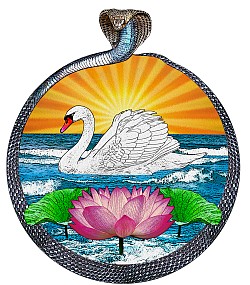 |
CRES is pleased to cosponsor the KC Vedanta
Society's
free presentation
of
Philip Goldberg
with Swami Chetanananda
including a reception
October 26 Saturday 10:30
Regnier Hall
KU Edwards Campus
12600 Quivira, Overland Park
with music by Ben Summers
|
|
Goldberg is author of American
Veda and The Life of Yogananda
Information: info@vedantakc.org
-- 816 444 8045
flier: https://www.vedantakc.org/yahoo_site_admin/assets/docs/2019-Sharma-flyer-rgb.259215708.pdf
#191110
Although this event is
not sponsored by CRES, we list it since its “Vern
Barnet Interfaith Service Award” is
named for CRES minister emeritus, the founder of the Kansas City Interfaith
Council (1989), then a program of CRES.
2019 November 10 Sunday 4:30-6:30
pm
Peace
Pavilion, 607 West Lexington, Independence
Annual Interfaith Thanksgiving
Dinner
with the Vern Barnet
Interfaith Service Award
this year to The
Peace Pavilion
 The
Heartland Chapter Alliance of Divine Love (website)
(Facebook) recognized
The Peace Pavilion with its yearly “Vern Barnet Interfaith Service Award.”
The Peace Pavilion is a non-profit organization devoted to teaching peace,
starting with children. The slogan of The Peace Pavilion is “Building Peace
by Creating Peacemakers.” Peace is more than the absence of war, and this
is illustrated by imaginative, interactive activities focusing on the four
concepts of *Peace for Me, *Peace for Us, *Peace
for Everyone, and
*Peace for the Planet. The
Heartland Chapter Alliance of Divine Love (website)
(Facebook) recognized
The Peace Pavilion with its yearly “Vern Barnet Interfaith Service Award.”
The Peace Pavilion is a non-profit organization devoted to teaching peace,
starting with children. The slogan of The Peace Pavilion is “Building Peace
by Creating Peacemakers.” Peace is more than the absence of war, and this
is illustrated by imaginative, interactive activities focusing on the four
concepts of *Peace for Me, *Peace for Us, *Peace
for Everyone, and
*Peace for the Planet.
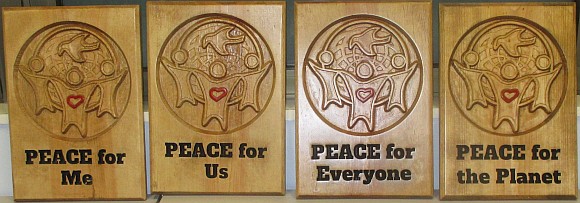
Long a presence in the Community of Christ Auditorium,
the Peace Pavilion is expanding to a stand-alone location for more space
for activities for children and adults.

Participants from the Greater Kansas
City Interfaith Council each offered “Benedictions of Gratitude.”
Additional photos are posted on the
Heartland
Chapter ADL Facebook page. Photo
coutesy HC ADL.
Greg McCoy was the evening's
Master of Ceremonies. Members of the Greater Kansas City Interfaith Council
each offered “Benedictions of Gratitude” for Thanksgiving in a touching
exhibition of interfaith comity.
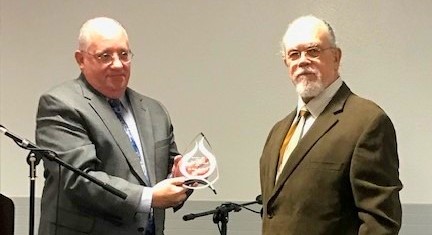
Andy Kroesen
accepts
The Vern
Barnet
Interfaith
Service
Award for
2019
from Greg McCoy |
The Executive Director of
Peace Pathways, Peace Pavilion, Andy Kroesen,
accepted the award. His extended remarks and illustrated presentation made
clear how much efforts such as The Peace Pavilion are needed in today's
world, and how the programs it offers is enhanced by the new facility.
The dinner was catered
by Evans Catering, LLC, a local minority-owned business which works with
nonprofits and community organizations. The meal included "regular" and
klosher turkey and a vegetarian entree.
Musical entertainment
was provided by Victor Dougherty and Rachel Marie during the dinner; and
following the award presentation, the SMART Club Singers concluded the
evening.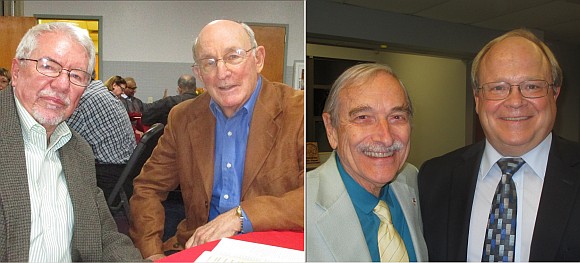 Among those attending the dinner:
the Rev David Nelson, DMin, with Larry Guillot, STD;
Among those attending the dinner:
the Rev David Nelson, DMin, with Larry Guillot, STD;
and Vern Barnet with Stephen Veazey,
Prophet-President of Community of Christ
HISTORY.— The annual
dinners were begun by CRES led by Vern
Barnet in 1984. CRES continued to host them for a quarter century at
various Kansas City sites through 2009 using a family “seder” liturgical
meal participatory format with real food interpreting the American multi-faith
experience. Children, their parents, and their friends, took speaking parts
in enjoying the meal with a script adapting and updating William Bradford’s
History
of the Plymouth Plantation.
When
Vern announced CRES was focusing its work on teaching, writing, and consulting,
and thus concluding the annual Interfaith Thanksgiving Sunday Family Ritual
Meal series in the context of many new interfaith organizations now working
in the Kansas City area, the Heartland
Chapter of the Alliance of Divine Love asked to continue an interfaith
Thanksgiving event. In its first year, 2010, the Vern Barnet
Interfaith Service Award was inaugurated with Vern being the first honoree.
The text of Vern’s acceptance remarks are recorded here.
The ADL’s event has been co-sponsored by the
Greater Kansas City Interfaith Council.
Past recipients
of the Vern Barnet Interfaith Service Award are Barbara Criswell (2018
at the St Paul's Episcopal Church), Sheila Sonnenschein (2017 at the Islamic
Center of Johnson County), Lama Chuck Stanford (2016), Ed Chasteen, PhD
(2015), Pam Peck (2014), the Rev Sam Mann (2013), Barb McAtee (2012), Dr
Larry Guillot (2011), and the Rev Vern Barnet, DMn (2010).
Jerusalem
Farm Benefit AN EVENING OF TANGO:
2019 Nov 23 Sat 7:30pm
St Mary's Episcopal Church,
1307 Holmes, 1307 Holmes, Kansas City, MO
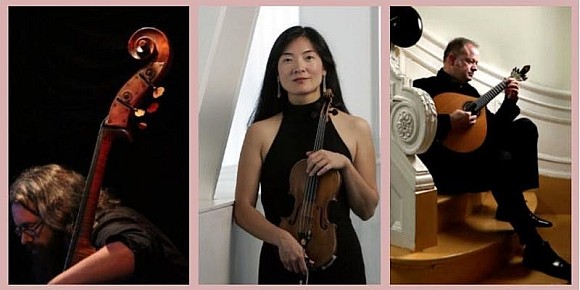
CRES was pleased to co-sponsor three of Kansas City’s
finest musicians, violinist Elizabeth Suh Lane, guitarist Beau Bledsoe
and bassist Jeff Harshbarger for an evening of passionate tango -- with
a post-concert reception featuring empanadas from Empanada Madness.
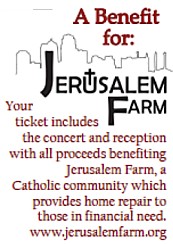 The ticket price of $50 included the concert and reception with all proceeds
benefiting Jerusalem Farm, an intentional community of service in the Catholic
tradition providing home repair to those in financial need. Jerusalem Farm
is built on the four cornerstones of Prayer, Community, Service and Simplicity.
The members say, "We strive to transform our lives and those around us
through service retreat experiences, sustainable living and home repair."
The ticket price of $50 included the concert and reception with all proceeds
benefiting Jerusalem Farm, an intentional community of service in the Catholic
tradition providing home repair to those in financial need. Jerusalem Farm
is built on the four cornerstones of Prayer, Community, Service and Simplicity.
The members say, "We strive to transform our lives and those around us
through service retreat experiences, sustainable living and home repair."
We at CRES know first-hand
both the work and the spirit of this remarkable group of people, and are
grateful that these outstanding musicians are honoring the work of the
Jerusalem Farm. The website is www.jerusalemfarm.org
#191126Brooks
Al Brooks is Kansas Citian of
the Year
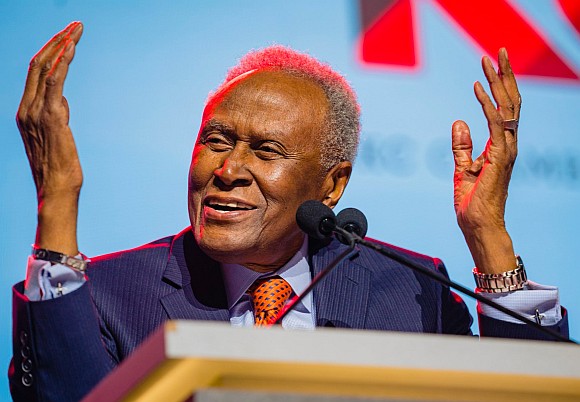 Called
to the platform, Al responds to the announcement that he is "Kansas Citian
of the Year"
Called
to the platform, Al responds to the announcement that he is "Kansas Citian
of the Year"
Our beloved friend Alvin Brooks
was
named the Kansas Citian of the Year at the 132nd annual dinner of the greater
Kansas City Chamber of Commerce 2019 November 26. A bio
video was shown about this amazing and inspirational Kansas City influence
and treasure. A physical award, "Ring Study," was a small sculpture
by famous sculptor Tom Corbin. The award was presented by former Mayor
Kay Barnes, who did so much to make the CRES 2002
September 11 observance so meaningful, and who presented Vern Barnet
the first Table of Faiths award in 2005. Those involved with the award
to Al, including Vern, were successful in keeping it a surprise. Al did
not figure it out until Mayor Barnes began, "This year's Kansas Citian
of the Year was born in Arkansas . . . ."
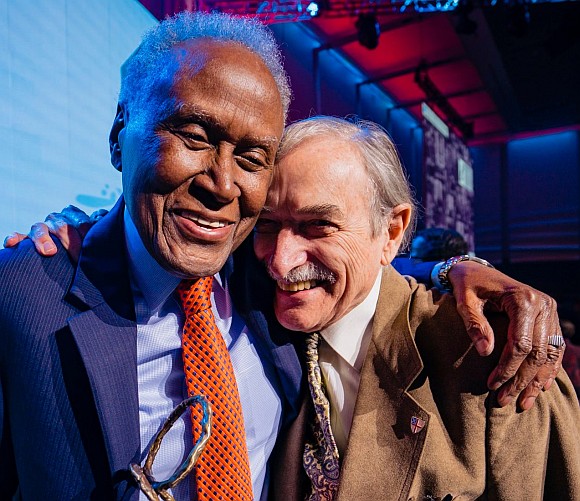
Vern offers
his congratulations to Al following the presentation. Photos credit:
Kyle
Rivas
Vern has edited
Al's 240,000-word memoir which is now in the hands of proofreaders.
Over 2,000 people attended
in the Kay Barnes Ballroom at the Convention Center. Speakers included
Kansas Governor Laura Kelly and Missouri Governor Mike Parson, both of
whom at length described their interests and concerns. An unusual kinetic
invocation was offered by Rockhurt University president, Fr Tom Curran.
Calvin Arsenia provided music during the dinner. John Sherman, the head
of the new KC Royals owners, was a surprise speaker. The "keynote" speaker
was actor Rob Riggle, who told lots of sports jokes.
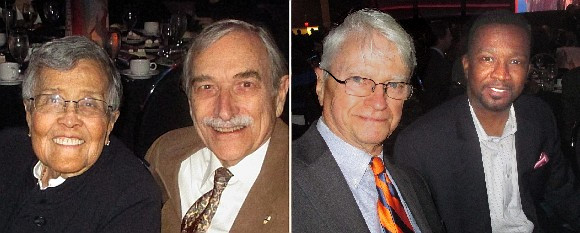
At the "family table,"
far away from where Al had been on pretext seated, Vern was lucky enough
to sit next to Mamie Hughes, who appears on the video. Also representing
CRES was John Gregory who sat next to Al's current sucessor at AdHoc, Damon
Daniel, who also appears on the video.
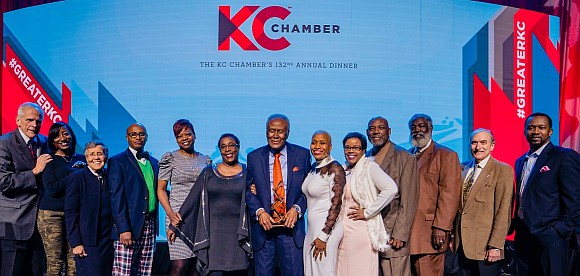
With the
award in hand, Al poses with folks brought forward from the "family table"
to the platform.
Al has been recognized
with dozens of awards, among them the CRES annual Thanksgiving award in
2002 "for his work as citizen and his career of public service locally
and internationally celebrating religious pluralism and the human spirit."
And, of course, President G H W Bush named him one of America's Thousand
Points of Light.
Thanks to the amazing
staff at the Chamber (especially Pam Whiting!) who made possible this surprise
award presentation to Al, so richly deserved.
Above a scene
of the Kay Barnes Ballroom; below two inset images of Al's surprise as
he learned he was selected the Kansas Citian of the Year, and then posing
with former Kansas City, MO Mayor Kay Barnes (Al was Mayor Pro Tem during
her eight years) and KC Chamber President and CEO Joe Reardon (former Mayor
of Kansas City, KS and Wyandotte County). Photos credit: Kyle Rivas
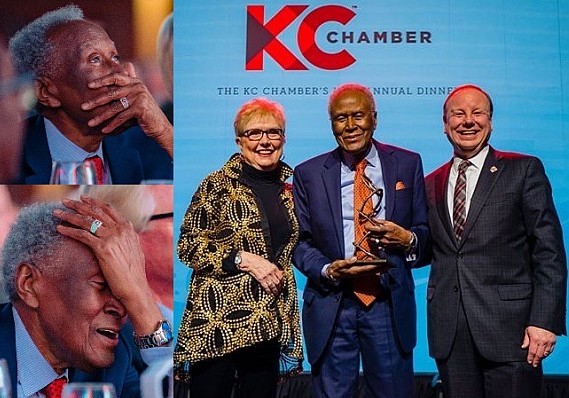
Here's a link
to the Dana and Parks 98.1 radio interview with Al on Nov 27.
The next Vital Conversation is
December 11
– In Pursuit of Peace: Community of Christ’s Journey
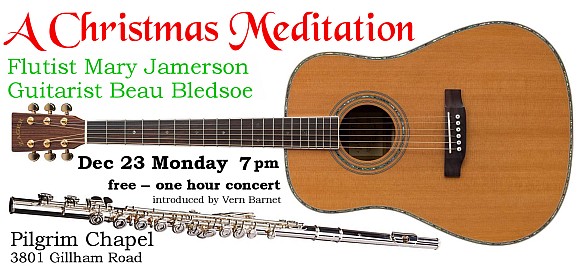
In the final rush of the Christmas season, take
a much-needed break with a soothing, uninterrupted hour of seasonal music
performed by two of Kansas City’s finest musicians, Mary Jamerson and Beau
Bledsoe. Enjoy the magical combination of flute and guitar in the beautiful
simplicity of Pilgrim Chapel.
Vern introduces the program. It's free.
December 23
Monday 7 pm, Pilgrim Chapel, 3801 Gillham Road
Mary Jamerson's website: www.maryjamerson.com.
Beau Bledsoe's website www.beaubledsoe.com.
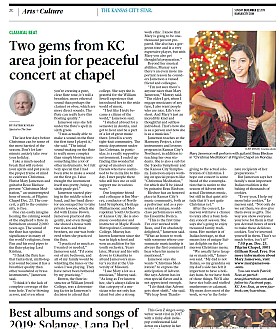 |
The Saint John's Bible
The first hand-illuminated Bible
since the invention of the printing press
One of seven volumes of the limited
set Heritage Edition (299 in the world) will be
on display with a docent for those who arrive early.
Wikipedia
- Bible website - LibCongress
|
REPORT --
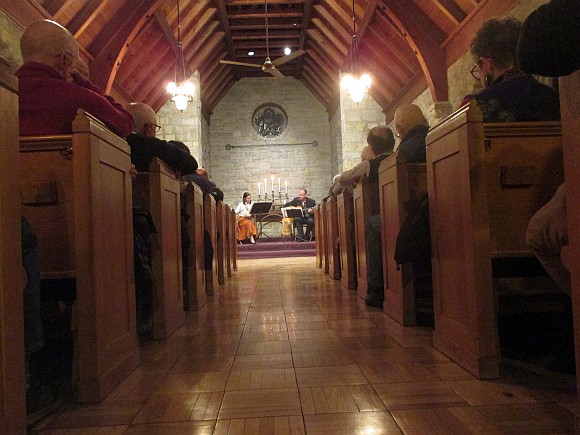
Pilgrim Chapel was packed. After all the pews were
filled, we opened the side room, which quickly was crowded; and filling
the foyer, people stood the whole hour there. Afterwards I was emailed
by one couple who could not get in, saying they will know better next time
not to show up one minute before starting time. We don't know how many
others were turned away; our apologies! The weather, the spare beauty of
the Chapel with poinsettias and candlelight, the season, the publicity,
and the fantastic musicians conspired to make a perfect, memorable evening
as Advent was ending and Christmas neared.
Before and after the performance, Saint John's Bible
docent Catherine Green (below, left) showed the Gospel volume of the 7-volume
set of the rare Heritage edition on loan from Grace and Holy Trinity Cathedral,
the only set in the Kansas City area. The Cathedral is eager to share this
amazing work of art and spirituality with other institutions. Recently
the SJB was exhibited at the Central Kansas City Public Library.
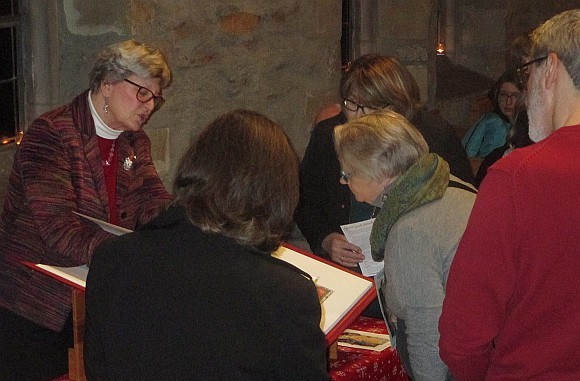
Answers to Quiz on Islam
- All
T/F are true except 1, 3, and 8; 6 is C.
OTHER ANNOUNCEMENTS

WEDDINGS
click
for information
We can provide a customized
ceremony. We regularly work with the great
folks at Pilgrim Chapel and are happy to serve
at any venue.
THANKS to Robert and Shye Reynolds,
a CRES fund to assist couples with fees for weddings has been established,
to celebrate their marriage June 19, 2002, on the occasion of their thirteenth
anniverary. |
FORTHCOMING BOOKS
see also
our publications page
in progress: KC Star, Many Paths
columns and fresh essays:
The Three
Families of Faith and the Three Crises of Secularism
Many have
asked for a compilation of columns Vern wrote for the KC Star, 1994-2012,
and the essays fatured in Many Paths. Here are tentative chapter
headings for the selections:
?
The Three Families of Faith ? Faith and the Arts ? Science and Religion
? Teachers of the Spirit ? Ritual and Worship ? Religion and Public Policy
? Specific Faiths (Buddhism, Islam, etc) ? Comparative topics (reincarnation,
gods, water, prophets, etc) ? How the column began and ended
|
OTHER
PROGRAMS
and SERVICES
If you would
like to engage Vern
or another member
of the CRES staff
for a speech,
consultation,
or other work
with your organization
or personally,
please visit www.cres.org/work/services.htm
or email vern@cres.org
|

A Vital Conversation Coffee
|
Vital
Conversations
monthly
schedule
2nd Wedneday of the month
1-2:30 pm
MidContinent Public Library
Antioch Branch
6060 N Chestnut Ave, Gladstone,
MO 64119
(816) 454-1306
|
You are welcome even if you
have not read the book or seen the movie
A Free Monthly
Discussion Group Led by David E Nelson
C R E S senior associate
minister
president, The
Human Agenda
“The purpose of a Vital Conversation is not to
win an argument,
but to win a friend and advance civilization.”
—Vern
Barnet
Vital Conversations are intentional gatherings
of people to engage
in dialog that will add value to the participants
and to the world.
In Vital Conversations, we become co-creators of
a better community.
—David Nelson
The discussions began May 24, 2002,
at the CRES facility
by examining Karen Armstrong’s
The
Battle for God
| Reading
is magic and a mysterious activity that feeds the mind, transports the
imagination, sooths the soul, and expands life. It is most often
done in solitude and yet connects us to so many others both near us and
far from us. Many readers enjoy the opportunity to share their reading
discoveries and to expand from the sharing of others. Reading is
an important aspect of our common humanness.
—David
E. Nelson
|
Vital Conv. Coffee
an open exchange of ideas
with no preset agenda
4th Wednesday monthly
8 am
Panera Bread
311 NE Englewood Road
Kansas City,
MO 64118
816-453-2770
|
#2019VitalSchedule
2019 Vital
Conversations Schedule
#VC190109
January 9 – Size Matters: Why We Love To Hate
Big Food by Charlie Arnot
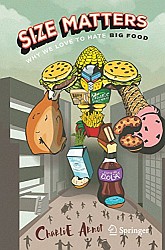
Despite food being safer, more affordable and more
available than at any time in human history, consumers are increasingly
skeptical and critical of today’s food system. Charlie Arnot, provides
thought provoking insight into how the food system lost consumer trust,
what can be done to restore it, and the remarkable changes taking place
on farms and in food companies. Charlie will be a part of our Vital
Conversation.
Quotations and questions selected
by David Nelson
1. “The
frequency and visibility of violation of public trust continue a steady
march. The very institutions that are supposed to expose deception
have themselves committed acts that erode public trust.” (5) Do you
agree? Can you name some of those institutions?
2. “The
implications of these improvements in productivity are immense. For
one thing, it means more food and less famine. Richard Jackson notes
that since Borlaug’s wheat took root, food shortages are driven more by
politics than the plow.” (36) How does politics result in food shortage?
3. “Science
is important, but not sufficient to build trust with the growing number
of consumers who look to social and digital sources of information to guide
their decisions in a world where emotion and opinion carry more weight
than objective fact. Fortified by sources of information that align
with their values and that confirm existing bias, doubters are rejecting
scientific consensus that conflicts with their beliefs.” (47) Can
you share an example of where your bias has gotten in the way of clear
decision making based on facts?
4. “Science
tell us if we can do something, but society tells us if we should…Values
are grounded in firmly held beliefs, not fact-based information. The path
to building trust begins by demonstrating you share the values of your
stakeholders. Consumers aren’t asking if we can do what we’re doing,
they are asking if we should do what we’re doing. We’ve been answering
the wrong questions.” (52) “As Stephen Covey said, ‘Contrary to what
most people believe, trust is not some soft, illusive quality that you
either have or you don’t; rather, trust is a pragmatic, tangible, actionable
asset that you can create.’” (57) How can food producers and
food consumers build more trust with each other?
5. “The
tribal connection influences where we get our information, but it also
influences the tone, the attitude, the demeanor of our communication.
While this happens naturally throughout daily experiences, it is amplified
exponentially online and has led to a disintegration of civility.”
How does the source of where you get your news and opinion impact your
behavior and relationships?
6. “Author
Douglas Rushkoff describes the situation well. ‘The television era was
about globalism, international cooperation, and the open society…Digital
media, by contrast, are made up of many discrete samples.” (79) Can
you identify some examples of this reality?
7. “The
global food population can be divided into three groups: the satisfied,
the undernourished and the over-nourished…Global hunger increased in 2016,
the first increase in more than a decade. The battle to assure everyone
is fed is as old as humankind.” (87) “We are invited to dinner.
Dinner without dogma, but with lots of dialogue. We must be engaged
in a discussion on the issues that really matter to people, animals and
the planet we share…Better is not a binary choice. Better is Yes,
And…” (93) Do you personally have feelings about this reality? What
are they? What will you do about it?

Charlie Arnot answers a question
in the remodeled library.
- - - - - - - - - - - - - - - - - - - - - -
Here is Clif Hostetler’s review of the book:
https://www.goodreads.com/review/show/2633930955
- - - - - - - - - - - - - - - - - - - - - - - -
- - - - - - - - - - - - - - - - - - - -
#190213
February 13 –While the World Watched
by Carolyn Maull McKinstry.
Luke Welsh joined guests Melanie Allmayer, Sonnenschein
Sheila, and Ameneh Pazerish, and convener David Nelson for this photo after
a fascinating and important discussion with 27 people crowding around the
table (see photo below).
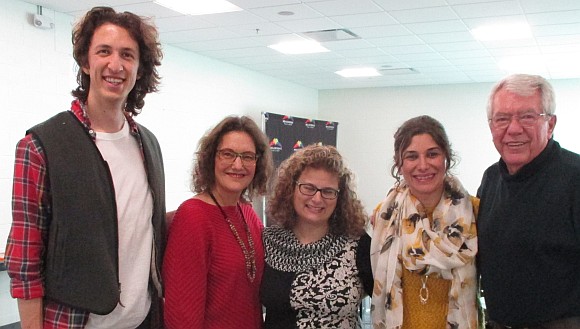
Quotations and questions selected
by David Nelson
A half century
has passed since the Ku Klux Klan bombed the Sixteenth Street Baptist Church
on September 15, 1963, that killed four young friends. For five decades
Carolyn Maull McKinstry has tried to forget the deaths, the inhumane injustice,
and the brutal assassinations of those who spoke out for change.
But now she feels compelled to write down in permanent ink her eye witness
account of exactly what happened. In 2018, Sheila Sonnenschein, Melanie
Allmayer, and Ameneh Pazerish, who live in the Kansas City area, traveled
on the Sisterhood of Salaam Shalom Civil Rights and Social Justice Trip
to the American South. They will be present at our book discussion.
These women from various religious communities visited Birmingham and met
the author.
“Hate
is too great a burden to bear…I have decided to love…If you are seeking
the highest good, I think you can find it through love. And the beautiful
thing is that we aren’t moving wrong when we do it, because John was right,
God is love.” MLK Jr. (page 1) Think of times you have chosen to
love and/or forgive instead of continuing to hate.
“On the
day after the church bombing, a young, white Birmingham attorney, Charles
Morgan Jr. publicly blamed the pillars of the city for the girls’ deaths.
‘Every person in this community who has in any way contributed during the
past several years to the popularity of hatred is at least as guilty, or
more so, than the demented fool who threw that bomb,’ Mr. Morgan said.”
(p. 73) Do you agree with Mr. Morgan? Are you, are we, contributing
to hate when we remain silent in the presence of verbal expressions of
vicious hatred for ‘others’?
“After the
funerals, no one mentioned again the four dead girls – my friends.
Not my parents, not my teachers, not my pastor, not my Sunday school teachers,
not my church members, not my friends. No one. It was like the word
cancer. No one wanted to say it out loud or acknowledge it.
And with the restroom ‘death chamber’ sealed off and walled up, offering
no visible reminder of the bombing, it was almost as if it never happened.”
(p.79) Why do you think this happened and can you think of other times
this was the case?
“And then
I sensed God planting in me a vision for my future. ‘Carolyn, I need you
to tell people that this is not about skin color or ethnicity or religion.
It is about love, it is about forgiveness, it is about reconciliation.
I need you to be my messenger, my ambassador.” (p. 201) Reflect on a time
in your life when you received a vision, a call, a nudge, to be a messenger.
“Bitterness
hurts only the people whose hearts house it, not the offenders. By
God’s grace, I choose to forgive Bobby Frank Cherry, Robert Chambliss,
Thomas Blanton, Herman Cash (a suspect who had died during the time the
investigation was reopened), and all the others who lived lives of hate.
It’s the difficult road, yet it’s also the road to ultimate freedom.” (p.
261) When you have let go of hate, even when you have the right to feel
it, have you felt relief and a new sense of self-worth?
“At its
core, forgiveness is a spiritual act – it’s not something we can do in
our own strength.” (p.274) What does that mean to you? Where
do you get your strength to forgive? “In order to truly love our
neighbors, we have to get to know them.” (p. 278) What are you doing
to get to know your neighbors better?
The Birmingham
Pledge
I believe that
every person has worth as an individual.
I believe that
every person is entitled to dignity and respect regardless of race or color.
I believe that
every thought and every act of racial prejudice is harmful; if it is my
thought or act, then it is harmful to me as to others.
Therefore,
from this day forward I will strive daily to eliminate racial prejudice
from my thoughts and actions.
I will discourage
racial prejudice by others at every opportunity.
I will treat
all people with dignity and respect; and I will strive daily to honor this
pledge, knowing that the world will be a better place because of my effort.
--While
the World Watched (p280)

Leroy Seat writing
9/15/13 about the four girls killed in the Birmingham bombing on 9/15/63:
https://theviewfromthisseat.blogspot.com/2013/09/in-memory-of-addie-cynthia-carole-and.html
- - - - - - - - - - - - - - - - - - - - - -
- - - - - - - - - - - - - - - - - - - - - -
#190313
March 13 – Some of My Best Friends Are Black
by Tanner Colby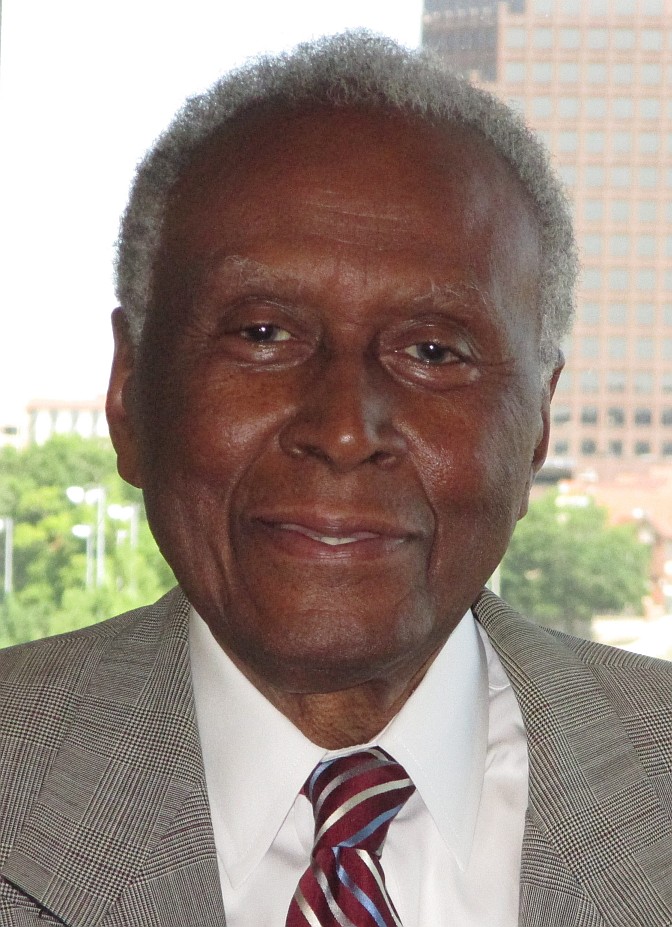
Much of the book is about
Kansas City, and Al Brooks appears beginning on page 116.
"Who would
expect a coauthor of two Saturday Night Live alumni biographies to pen
a thoughtful, judicious, yet provocative social history of American race
relations? Evenhanded, felicitously written, and animated by numerous interviews,
Colby’s book is a pleasure . . . .” — Library Journal
“Pointing
out the shortfalls of court-ordered busing, affirmative action, and other
well-intentioned programs, Colby’s charming and surprisingly funny book
shows us both how far we’ve come in bridging the racial divide and how
far we’ve yet to go.” — Publishers Weekly
Clif
Hostetler's Review: https://www.goodreads.com/review/show/2731381800
Some of My Best Friends are Black, by Tanner
Colby Ed Kail, facilitator
Questions
from David Nelson
Using a
historical/case study approach, Tanner Colby describes the “strange story
of integration in America.” Beyond the societal and political dynamics
of segregation and integration, he reflects on the phenomenon of racial
separation in American society. Why is it that people of different races
in this country largely do not associate or develop close relationships?
Colby examines
4 segments of American society: a) schools/public education; b) housing
and real estate development; c) business and industry; and d) religion/church.
In preparation
for our Vital Conversation, consider several questions for personal reflection:
1) It is
widely held that “race” is a social construct: an idea developed as a category
for distinguishing people from one other in society. What is your understanding
of race? Beyond simple appearances – “color of skin” – what are the functioning
elements of race in America – and in your life?
2) What
has been your own personal experience of “racial separation” throughout
your life? What’s one story you could tell?
3) Of the
4 societal segments Colby uses to organize his book, with which one do
you most strongly resonate intellectually, and emotionally?
4) In a
public presentation at Rockhurst College, Tanner Colby described Kansas
City as the epicenter for the “racialization of space” in American cities,
due to the leadership and work of J. C. Nichols. What do you think, and
how does that make you feel?
5) In response
to this book, what are you motivated to do?
Note: Part
2 of Colby’s book, which features a case study of real estate development
and housing in Kansas City, is partly based upon work by Kevin F. Gotham
in his book Race, Real Estate and Uneven Development: The Kansas City Experience,
1900 – 2000. Five years ago, I was able to check out a copy from the Public
Library on inter-library loan. I discovered last month that the two copies
owned by the system have been designated “reference works” and are listed
for “in-library” reading only.
#190313seat
EXCERPTS from The
View from This Seat, a blog by Leroy Seat, Ph.D
Some of My Best Friends are Black
At the March
13 Vital Conversations meeting, the 25 or so who attended discussed Tanner
Colby’s book Some of My Best Friends are Black: The Strange Story of
Integration in America (2012).
The meeting
was a very helpful one, especially since there were four African-Americans
present—including the venerable Alvin Brooks (b. 1932), a civil rights
leader who is a former police officer and former city councilman of Kansas
City.
The second
part of Colby’s book is about racial segregation in housing—and in getting
loans for purchasing a home. The situation in Kansas City is a prime example
of segregation having been actively enforced by housing planning—and restrictions.
In particular,
Colby writes about J.C. Nichols, whom Colby (no doubt rightfully) calls
“the most influential real estate developer” in the U.S. during the first
half of the twentieth century. Colby adds, “One could make the argument
that he still holds that title today, despite being dead for sixty years.”
(p. 82).
(Specifically,
Nichols died in February 1950, several months before his 70th birthday.)
Nichols
was the developer of Kansas City’s Country Club Plaza, regarded as the
nation’s first shopping center. After his death, he was memorialized with
the impressive J.C. Nichols Memorial Fountain, just east of the Plaza,
and the nearby street renamed the J.C. Nichols Parkway in 1952.
The King
of Kings County.-- In addition to the County Club district and Plaza
in Kansas City, Missouri, a lasting legacy of J.C. Nichols is the development
of Johnson County, Kansas, whose eastern border is just a mile west of
the Plaza.
That story,
which is told to some extent in Colby’s book, is the theme of the novel
The King of Kings County (2005) by Whitney Terrell, a nephew by marriage
to J.C. Nichols’ son Miller.
As Colby
writes, the novel “tells the story of Kansas City’s blockbusting and suburbanization
in a way that only a novel can: fictionalized, but brutally truthful” (p.
291).
(In the
book, Nichols is called Bowen, the Plaza is Campanile, and Johnson County
is Kings County, but for those who know the history of Kansas City, the
identification is obvious.)
Thanks to Leroy
for permission to quote these excerpts. For the complete blog entry, click
here.
- - - - - - - - - - - - - - - - - - - - - - - -
- - - - - - - - - - - - - - - - - - - -
April 10 – Something Beautiful Happened:
A Story of Survival and Courage in the Face of Evil by Yvette Manessis
Corporon.
At once
a very personal memoir and an ambitious account of the untold history of
the Greek Jews and a nuanced story about the important of kindness and
the courage to stand up for what’s right, no matter the cost. Mindy
Corporon plans to attend and share her personal connections with this powerful
and healing story.
Clif Hostetler's review Mar 22, 2019 at
Goodreads
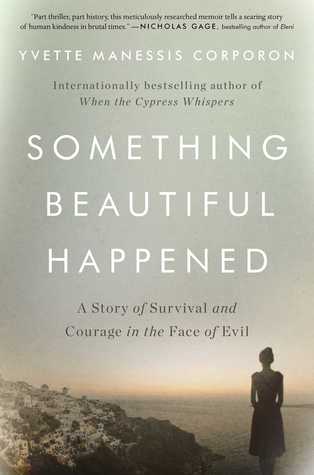
A holocaust story and a recent hate
crime, two events separated by seventy years and apparently unrelated to
each other except for the fact that they involved members of the author’s
extended family. These events anchor this memoir to provide optimistic
life lessons by honoring the good that can grow out of evil events.
The author
grew up hearing stories about her grandmother’s youthful years living on
a small Greek island. Included with those stories was an account of a Jewish
tailor and his daughters who were able to hide from the Nazis on the island
during WWII. After her grandmother’s death the author became curious about
this story and began efforts to locate descendants of this Jewish family.
Just when this effort began to meet with some success the author received
news that her nephew and his grandfather had been gunned down in a hate
crime on April 13, 2014 in Overland Park, Kansas.
This recent
tragic event becomes part of this memoir's story while asking the question,
how does one go on with life after events like this. The book describes
efforts made in response to both events that were made to honor the good
in life and spread better understanding in the battle against hate. As
the author recounts these events we also learn about the history of removal
of Jews from Greece by the Nazis as well as a description of the author's
childhood as part of the Greek immigrant community in America.
The book
tells the story of the founding of the Faith
Always Wins Foundation to promote "dialogue for the betterment of our
world through kindness, faith and healing." It was founded by the mother
and daughter of the nephew and grandfather who were slain in Overland Park.
Also, the book's narrative climaxes with an account of a reunion of descendants
of the WWII era story on the small Greek island to honor and memorialize
the bravery of those involved with that incident. All these events are
described with words saturated in emotion.
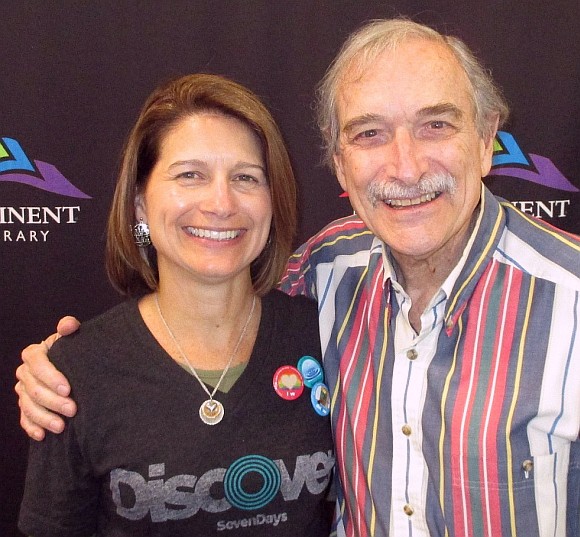
Mindy, who founded the Faith
Always Wins Foundation, spoke eloquently, frankly, and movingly as
she answered questions about the book and how her life had changed following
the murders of her father and son, now five years ago.
Vern thanked her for persisting
through the horror and hate, and transforming the experience into gifts
of understanding for our community and the nation.
- - - - - - - - - - - - - - - - - - - - - - - -
- - - - - - - - - - - - - - - - - - - -
May 8 – Born A Crime by Trevor Noah
Trevor Noah's
unlikely path from apartheid South Africa to the desk of The Daily Show
began with a criminal act: his birth. Trevor was born to a white Swiss
father and a black Xhosa mother at a time when such a union was punishable
by five years in prison. His stories weave together to form a moving
and searingly funny portrait of a boy making his way through a damaged
world in a dangerous time, armed only with a keen sense of humor and a
mother's unconventional, unconditional love.
- - - - - - - - - - - - - - - - - - - - - -
- - - - - - - - - - - - - - - - - - - - - -
June 12 – Religion for Atheists: A Non-Believer's
Guide to the Uses of Religion by Alain de Botton
De Botton suggests that rather than mocking religion, agnostics and atheists
should instead steal from it – because the world’s religions are packed
with good ideas on how we might live and arrange our societies. He
looks to religion for insights into how to build a sense of community,
make relationships last, overcome feelings of envy and inadequacy, inspire
travel, get more out of art, and reconnect with the natural world.
Releasing
Conversation: Share your name and one thing you appreciate
about religion (any religion).
Quotes and questions selected
by David E. Nelson
“Let us bluntly state that of course no religions are true in any God-given
sense….The premise of this book is that it must be possible to remain a
committed atheist and nevertheless find religious sporadically useful,
interesting and consoling -- and be curious as to the possibilities of
importing certain of their ideas and practices into the secular realm.”
(page 11-12) How do you feel about looking at religion, both your
own and others, and finding new ideas and truth of value?
“We invented religions to serve two central needs: first, the need to live
together in communities in harmony, despite our deeply rooted selfish and
violent impulses. And second, the need to cope with terrifying degrees
of pain.” (page 12) Do you agree that these are the two reasons
for religion? Can you think of others?
“The church views the ill, the frail of mind, the desperate and the elderly
as representing aspects of humanity and (even more meaningfully) of ourselves
which we are tempted to deny, but which bring us, when we can acknowledge
them, closer to our need for one another.” (page 35) Share an experience
when this reality became yours. Has your faith been influenced by
“the least of these” in a positive manner?
“The Day of Atonement has the immense advantage of making the idea of saying
sorry look like it came from somewhere else, the initiative of neither
the perpetrator nor the victim.” (page 56) Is it difficult for you
to apologize? Why or why not?
“Religions are wise in not expecting us to deal with all of our emotions
on our own. They know how confusing and humiliating it can be to
have to admit to despair, lust, envy or egomania.” (page 62-63)
Do you have a community where you can deal with your emotions?
“Much of modern moral thought has been transfixed by the idea that a collapse
in belief must have irreparably damaged our capacity to build a convincing
ethical framework for ourselves.” (page 79) Do you agree?
Explain.
“The object of universities is not to make skillful lawyers, physicians
or engineers. It is to make capable and cultivated human beings…a
proper cultural education should inspire in us a love of our neighbor,
a desire for clearing human confusion and for diminishing human misery…it
should engender nothing less than the ‘noble aspiration to leave the world
better and happier than we found it.’” (page 102) Did your
education experience foster these values? Can our higher education
system today advance these qualities in more and more people?
“The difference between Christian and secular education reveals itself
with particular clarity I their respective characteristic modes of instruction;
secular education delivers lectures, Christian sermons. Expressed
in terms of intent, we might say that one is concerned with imparting information,
the other with changing our lives.” (page 115-117) Can secular
education become more about “changing our lives” and should it?
“Mary in Christianity, Isis in ancient Egypt, Demeter in Greece, Venus
in Rome and Guan Yin in China have all functioned as conduits to recollections
of early tenderness.” (page 171) Who are our models for tenderness
today? How do we remember them and share their stories with our children
and each other?
“The secular are at this moment in history a great deal more optimistic
than the religious.” (page 183) Do you agree? If so,
why and if not, why? Should we strive for more optimism in today’s
world?
“Out secular world is lacking in the sorts of rituals that might put us
gently in our place. It surreptitiously invites us to think of the
present moment as the summit of history, and the achievements of our fellow
humans as the measure of all things – a grandiosity that plunges us into
continuous swirls of anxiety and envy.” (page 200) What are
the rituals you use and treasure in your life? Are they enough to
keep you growing on a strong human path?
Clif Hostetler's
review of Religion for Atheists: A Non-believer's Guide to the Uses
of Religion,
by Alain de
Botton: https://www.goodreads.com/review/show/738112065
- - - - - - - - - - - - - - - - - - - - - - - -
- - - - - - - - - - - - - - - - - - - -
#190710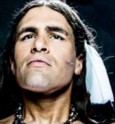
July 17 – Books About Crazy Horse. Samn
Wright who wrote and performed his one-man play at Atkins-Johnson last
year joined us. The play has been presented about 40 times, including in
the UK, and future performances are being demanded. With the knowledge
of a scholar and the grace of a friend, Samn answered questions throughout
the hour about Crazy Horse, his culture, various books about Crazy Horse,
and about the process of writing the play and performing it. Samn said
he approaches the performances as a spiritual activity. A short video appears
at https://www.youtube.com/watch?v=mYY-fOLZWSg
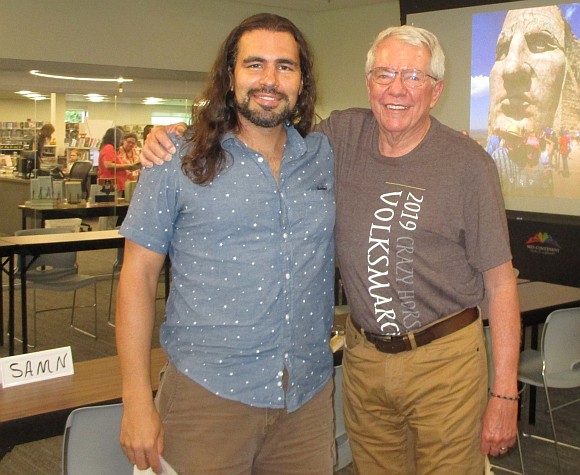
Shown here with David Nelson and a slide of the
emerging Crazy Horse monument David took recently, Samn has been seen over
the years in theatre ranging from The Hindu and the Cowboy
and the title roles in Shakespeare's Hamlet and The Who's
Tommy.
He
is currently performing in The Summer House in the Fringe
Festival.
Releasing Conversation: Share
your name and something you learned about Crazy Horse or about yourself
in reading about Crazy Horse.
From Curly to Crazy Horse:
Leadership Lessons for Today
By David E. Nelson
I have discovered
clues to leadership for our time in the stories of Chief Crazy Horse.
A combination of Francis of Assisi and General Paton, Crazy Horse brought
together some of the finest qualities of the human spirit. He lived
his truth in a way that invited others to live theirs. He was captured
by a vision that inspired and drove him to acts of bravery and compassion.
He became a community leader and yet remained emotionally intimate with
family. He grieved the death of a daughter and the defeat of his
people and yet never confused particular outcomes with eternal realities.
From
Curly to Crazy Horse is a story of the paradox of human leadership
for today.
Curly loved
his life. His father was Oglala Sioux and his mother Brule.
He spent time with both peoples and learned that two legged are not all
the same. Like the winged and four legged, humans were all different
and all unique. His early years were lived in joy and security.
He had no idea that he would one day be thrust into the forefront of the
most critical struggle ever to face his people. Although Crazy Horse
did not write in a book, he stored his learning in his head. He would
put together ideas and new insights and in his nightly meetings with the
elder would share stories and thoughts that would challenge even grandfather
and grandmother. His early days would remain an important time of
growth and learning. Curly would never lose sight of these days of
peace and harmony. All life is connected. All the world is
in a sacred balance. “irresistible attraction” is the notion that
life is good and that we are unique and wonderful human beings. When
you start to enjoy your uniqueness rather than attempt to become more like
someone else you become more attractive to others.
In the stories
and legends about Crazy Horse I have discovered some clues for the paradox
of leadership in our tie.
Leaders
are born and emerge in a context.
Leaders are personally strong and
build strong communities.
Leaders seek to understand the past
and not stay there.
Leaders have deep roots in their
heritage and become culture brokers.
Leaders make clear plans and never
get stuck in them.
Leaders have inner vision and open
eyes.
Leaders take time to care for themselves
and others. (In that order.)
Leaders have thinking hearts and
feeling minds.
Leaders see the big picture and sweat
the small stuff.
Leaders anticipate the future and
life full in the present.
Even in
his death Crazy Horse remains an inspiration to his people and others who
pay attention to his story to live and dies with dignity, courage, and
hope. Death may end a life, but it does not end a relationship.
- - - - - - - - - - - - - - - - - - - - - - - -
- - - - - - - - - - - - - - - - - - - -
August 14 – Why Religion? by Elaine
Pagels -- A provocative and deeply moving memoir from one of the most compelling
religious thinkers at work today. Pagels explore the spiritual dimension
of human experience by sharing events from her own life journey.
She revisits how these losses taught her to think more deeply about suffering
and how the world’s religions have addressed it. Readers of all faiths,
and none, can learn from her brilliance and courage. She is shown below
with Vern in May, 2001, in Lawrence, KS, at the University where she was
a guest lecturer.
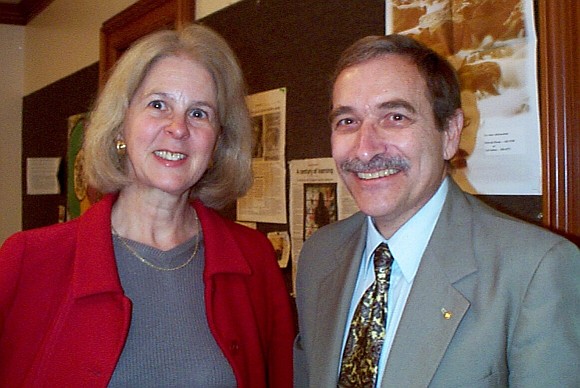
Releasing Conversation: Share your
name and your response to the question: “Why Religion?”
Quotes
and questions selected by David Nelson.
“Am I religious?”
Yes, incorrigibly, by temperament, if you mean susceptible to the music,
the rituals, the daring leaps of imagination and metaphor so often found
in music, poems, liturgies, rituals, and stories – not only those
that are Christian, but also to the cantor’s singing at the bar mitzvah,
to Hopi and Zuni dances on the mesas of the American Southwest, to
the call to prayer in Indonesia. But when we say “religious,” what are
we talking about?” (p.32) What do you most appreciate about religion?
Are their activities you have appreciated from other religions?
I began
to see what fascinated him (Heinz) about investigating the natural world,
from the “big bang” to elementary particles and galaxies; and he
became intrigued with the secret gospels…I never felt so close to
anyone.” (p. 37) Share a story of conversation with another person
whose life focus and experience were vastly different from you own and
yet you connected in a meaningful way.
Whatever
most people mean by faith was never more remote than during times of
mourning, when professions of faith in God sounded only like unintelligible
noise, heard from the bottom of the sea. (p. 98) Have you experienced
expressions of faith that seemed empty, meaningless, or even downright
painful at times of loss or tragedy? (Example: “God needed another child
in heaven.”
We found
no meaning in our son’s death, or in the deaths of countless others. The
most we could hope was that we might be able to create meaning. (p.
104) What is the difference between finding meaning in something
and creating meaning? Can you illustrate? “You have no choice about
how you feel about this. Your only choice is whether to feel it now
or later.” Although her comment helped a little at first, during the next
twenty-five years I would keep discovering that how much I was able
to feel, or not, and when, was not a matter of choice. (p. 121) How
have you experienced and processed feelings during your life? Can
you control when and how you feel?
After we
sat together in silence for more than an hour, I asked about something
strange that happened during the meditation. “Thomas, I felt as though
waves of energy were coming toward me from various directions, like
waves and ripples in an ocean, as though people were sending me energy;
but I have no idea from whom they came. What – if anything – do you
make of this?” Before that time, when someone said to me “I’m praying
for you,” I’d assumed that this was a vague gesture, a nod to good intentions,
the pious equivalent of saying “Let’s have lunch sometime.” (p. 129)
What is your intention when you pray for someone? What is your expectation
when you pray for someone? How do you feel about the criticism today
that “thoughts and prayers” are not enough in relation to the mass
shootings?
“Do you
believe in life after death?” “Yes, of course – but not my life after my
death.” (p. 137) What does the author mean? What does “life after
death” mean to you? I still wanted to believe that we live in a morally
ordered universe, in which someone, or something – God or nature?
– would keep track of what’s fair? (p. 167) Do you believe that we
live in a moral universe?
Emerging
from a time of unbearable grief, I felt that such sayings offered a glimpse
of what I’d sensed in that vision of the net. They helped dispel
isolation and turn me from despair, suggesting that every one of
us is woven into the mysterious fabric of the universe, and into
connection with each other, with all being, and with God. (p. 177) Do you
have visions, experiences, and memories that give you such hope?
Is this the authors answer to the question “Why Religion?”
- - - - - - - - - - - - - - - - - - - - - - - -
- - - - - - - - - - - - - - - - - - - -
#190911
September 11 – The Glass Castle by Jeannette
Walls. -- This inspiring novel that really deals with problems that many
face, neglect. The mother doesn't care enough to be a true mom, and the
father is too busy getting drunk to care in a fatherly way. Which leaves
the children with a lot to be desired. In a quest for independence and
to find a way through life the children separate, and it shows many different
paths life can lead you down It is truly an inspirational book, that
shows you don't need someone always and to never give up.
Clif Hostetler's review:
https://www.goodreads.com/review/show/99302037
Preparation quesions from
David:
1. Rex and Rose Mary Walls were unconventional
parents, but were they abusive? Why or why not?
2. What does the glass castle signify
to Jeannette and her father. Why is it important that, just before leaving
for New York, Jeannette tells her father that she doesn't believe he'll
ever build it?
3. The first story Walls tells of
her childhood is that of her burning herself severely at age three, and
her father dramatically takes her from the hospital: "You're safe now".
Why do you think she opens with that story, and how does it set the stage
for the rest of the memoir?
4. Rex Walls often asked his children,
"Have I ever let you down?" Why was this question (and the required "No,
Dad" response) so important for him -- and for his kids? On what occasions
did he actually come through for them?
5. Jeannette's mother insists that,
no matter what, "life with your father was never boring". What kind of
man was Rex Walls? What were his strengths and weaknesses, his flaws and
contradictions?
6. Discuss Rose Mary Walls. What
did you think about her description of herself as an "excitement addict"?.
7. Describe Jeannette's relationship
to her siblings and discuss the role they played in one another's lives.
8. In college, Jeannette is singled
out by a professor for not understanding the plight of homeless people;
instead of defending herself, she keeps quiet. Why do you think she does
this?
9. Were you surprised to learn that,
as adults, Jeannette and her siblings remained close to their parents?
Why did the parents follow their children to New York? Why did the children
keep seeing them?
10. What character traits -- both
good and bad -- do you think that Jeannette inherited from her parents?
And how do you think those traits shaped Jeannette's life?
11. For many reviewers and readers,
the most extraordinary thing about The Glass Castle is that, despite
everything, Jeannette Walls refuses to condemn her parents. Were you able
to be equally nonjudgmental?
- - - - - - - - - - - - - - - - - - - - - - - -
- - - - - - - - - - - - - - - - - - - -
 October
9 – The Handmaid's Tale by Margaret Atwood. -- In the world
of the near future, who will control women's bodies? Offred is a
Handmaid in the Republic of Gilead. Handmaids are only valued if their
ovaries are viable. Offred can remember the days before, when she lived
and made love with her husband Luke; when she played with and protected
her daughter; when she had a job, money of her own, and access to knowledge.
But all of that is gone now. Funny, unexpected, horrifying, and altogether
convincing, The Handmaid's Tale is at once scathing satire, dire
warning, and tour de force. “The Handmaid’s Tale” is also a TV series. October
9 – The Handmaid's Tale by Margaret Atwood. -- In the world
of the near future, who will control women's bodies? Offred is a
Handmaid in the Republic of Gilead. Handmaids are only valued if their
ovaries are viable. Offred can remember the days before, when she lived
and made love with her husband Luke; when she played with and protected
her daughter; when she had a job, money of her own, and access to knowledge.
But all of that is gone now. Funny, unexpected, horrifying, and altogether
convincing, The Handmaid's Tale is at once scathing satire, dire
warning, and tour de force. “The Handmaid’s Tale” is also a TV series.
Clif Hostetler's review of The Handmaid's Tale.
https://www.goodreads.com/review/show/2997043784
- - - - - - - - - - - - - - - - - - - - - - - -
- - - - - - - - - - - - - - - - - - - -
#VC191113
November 13 – Kansastan: Ad Allah Per Aspra
by Farooq Ahmed
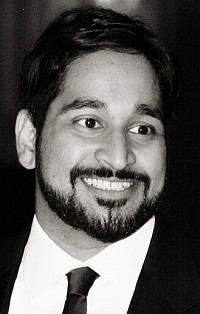 Inspired
by the American Civil War, Kansastan takes place in a dystopic Kansas that
is besieged by its neighboring state, Missouri. Close to the state line,
an orphaned and disabled goatherd lives atop a minaret and is relegated
to his aunt and cousin arrive, the mosque’s congregants believe that the
cousin, Faisal, is a young prophet. Faisal comes to also believe in his
divinity stoking the goatherd’s envy and hatred. Kansastan is a singular
work, infused with Islamic folklore, Quranic lyricism, and Old Testament
tales. Farooq Ahmed was raised in Kansas City and now lives in Los Angeles
with his wife, two children, and a fear of earthquakes; he will join us
in our conversation. Inspired
by the American Civil War, Kansastan takes place in a dystopic Kansas that
is besieged by its neighboring state, Missouri. Close to the state line,
an orphaned and disabled goatherd lives atop a minaret and is relegated
to his aunt and cousin arrive, the mosque’s congregants believe that the
cousin, Faisal, is a young prophet. Faisal comes to also believe in his
divinity stoking the goatherd’s envy and hatred. Kansastan is a singular
work, infused with Islamic folklore, Quranic lyricism, and Old Testament
tales. Farooq Ahmed was raised in Kansas City and now lives in Los Angeles
with his wife, two children, and a fear of earthquakes; he will join us
in our conversation.
Farooq Ahmed is a graduate
of the Columbia University Creative Writing Program and of Brown University,
where he studied biochemistry. His writing has appeared in the Financial
Times, Nature, and the Proceedings of the National Academy of Sciences,
and has been lauded by the South Asian Journalists Association. You can
follow him on Twitter (@mcfruke).
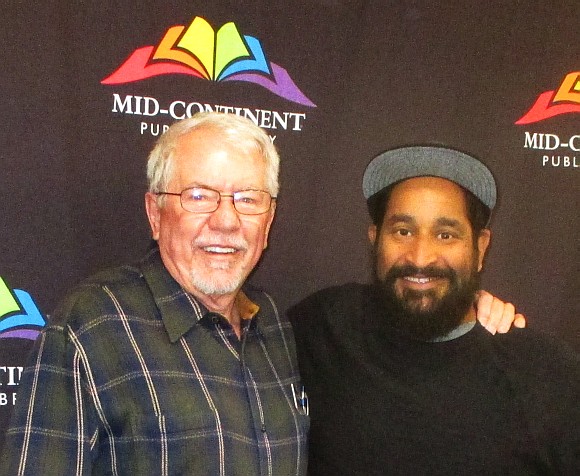
Vital Conversations organizer and Leader David
Nelson and guest author Farooq Ahmed pose for a photo before an exceptionally
interesting session on Kansastan.
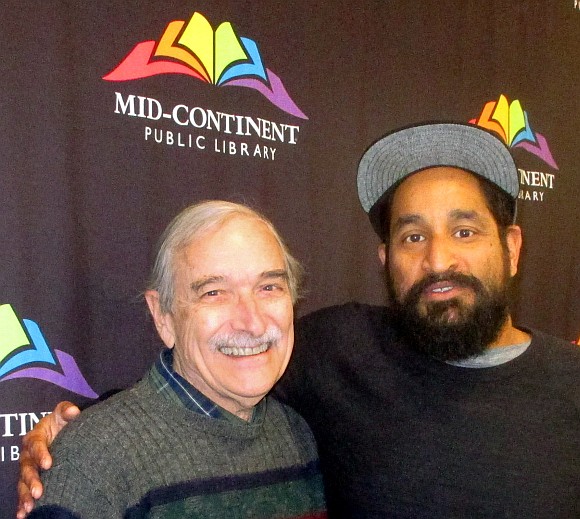 Vern and Farooq visited briefly before the discussion began.
Vern and Farooq visited briefly before the discussion began.
David began by asking
us each to say breifly about what “home” meant to each of us since the
book in a way asks us to think about home.
David and the full complement
of regulars and guests asked about the unusal language of the novel, the
relationship of the book to the author's life, how folks around the country
think of the State of Kansas stimulated by this work of fiction set in
the area of the "border wars" between Kansas and Missouri, the stories
from the Judeo-Christian-Muslim tradition brought into the story, how the
9/11 experience affected him, how the book is being received in various
settings, how the book reflects current national and international realities,
in what sense the book is “halal,” peering into the writer's methods and
approaches, what future writing projects Farooq has in mind, and other
fascinating topics raised by David and others around the room. We are eager
to see what he next produces with his perspective enriched perhaps by his
interfaith marriage, his formal studies, his travels abroad, the reception
of this, his first novel, and his increased appreciation for the craft
of writing.
* Amazon: https://www.amazon.com/Kansastan-Farooq-Ahmed/dp/1732868689
* Kansastan
website: www.kansastan.com/
* Clif
Hostetler's review
https://www.goodreads.com/book/show/45681477-kansastan
* KCUR
INTERVEIW page with ANNE KNIGGENDORF and
GINA KAUFMANN's
radio
interview NOV 2, 2019 from 20min20sec - 37min.
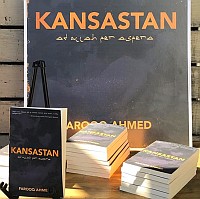 OTHE
AREA EVENTS with FAROOQ OTHE
AREA EVENTS with FAROOQ
November
10 Sunday 4 pm
Kansas City KANSASTAN Launch
Prospero's Books -- 1800 W 39th St,
Kansas City, MO
November
14 Thursday 7 pm -- MikroBrews Series, Wichita, KS
86 Cold Press, 600 East Douglas
Avenue
November
15 Friday 7 pm
-- Driptorch Series, Manhattan, KS
Arrow Coffee Co., 1800 Claflin Road
|
- - - - - - - - -
- - - - - - - - - - - - - - - - - - - - - - - - - - - - - - - - - - -
December 11 – In Pursuit of Peace: Community
of Christ’s Journey by Andrew Bolton, John Hamer, David Howlett,
Lachlan Mackay, and Barbara Walden
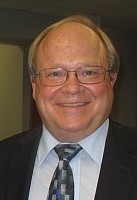 The vision of Zion, the Peaceable Kingdom, was at the heart of the 19th
Century movement that gave birth to the Community of Christ. Once
known as the Reorganized Church of Jesus Christ of Latter Day Saints” (RLDS),
since 2001 the Community of Christ has its international headquarters in
Independence, Missouri.
The vision of Zion, the Peaceable Kingdom, was at the heart of the 19th
Century movement that gave birth to the Community of Christ. Once
known as the Reorganized Church of Jesus Christ of Latter Day Saints” (RLDS),
since 2001 the Community of Christ has its international headquarters in
Independence, Missouri.
Stephen Veazey, Prophet-President
of Community of Christ, shown here, plans to join the conversation.
The Community of Christ
was an important partner at the 2001 "Gifts of Pluralism" Conference arranged
by CRES with the participation of the Interfaith Council.
Here is Clif Hostetler's
review:
https://www.goodreads.com/review/show/3065341197
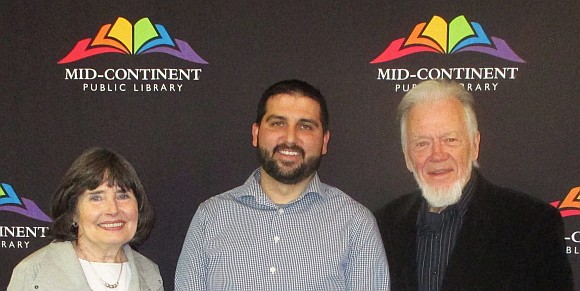
As it happened neither Prophet-President Stephen
Veazey nor our Vital Conversations organizer David Nelson were able to
attend. In Veazey's stead were Cathi Cackler-Veazey, Chair of PeacePathways,
and Zac Harmon-McLaughlin, Seminary Director at Graceland University; leading
the discussion this time was blogger extraordinaire and author Leroy Seat.
Our guests answered 90 minutes of questions with the most delightful combination
of grace, humility, knowledge, and neighborliness. Leroy was careful to
make sure everyone had a chance to participate and shaped the session by
exemplifying mutual respect and a shared passion for community and peace.
- - - - - - - - - - - - -
The 2020 Vital Conversations schedule is on our
2020 page here:
programs2020.htm#VCschedule
Selections are subject to change. If you
would like to be reminded and have additional information, contact David
Nelson at humanagenda@gmail.com or call (816) 453-3835
ABOUT CRES PARTICIPATION
Having spawned several other
organizations,
including the Greater
Kansas City Interfaith Council,
we
continue to offer programs initiated by and through others
but we no longer create our
own in order to focus on our unique work.
For interfaith and cultural
calendars maintained by other groups, click
here.
|
 Vern
preached on What Judaism Offers a World of Diversity at Temple
Israel for the March 8 Friday 6 pm Shabbat service with a splendid
potluck following. He argued that interfaith relations are important, and
cited the special role of Judaism in the recovery of a sense of the sacred
in our desacralized global culture. The tradition's emphasis on rules by
which human relationships can best be respected (such as the Decalogue),
by its understanding of a covenantal relation with the divine and within
the community, and the significance of historical (social and political)
processes are distinctive and yet universal in their application, and underlie
much of Western culture.
Vern
preached on What Judaism Offers a World of Diversity at Temple
Israel for the March 8 Friday 6 pm Shabbat service with a splendid
potluck following. He argued that interfaith relations are important, and
cited the special role of Judaism in the recovery of a sense of the sacred
in our desacralized global culture. The tradition's emphasis on rules by
which human relationships can best be respected (such as the Decalogue),
by its understanding of a covenantal relation with the divine and within
the community, and the significance of historical (social and political)
processes are distinctive and yet universal in their application, and underlie
much of Western culture.



 Vern
spoke April 6 Saturday at 9 for
Vern
spoke April 6 Saturday at 9 for
 A
Personal Appreciation
A
Personal Appreciation
 Vern
honored with "Pioneer" award at the
Vern
honored with "Pioneer" award at the

 Bill
Tammeus writes July 25 in his “Faith
Matters”
blog about Geneva Blackmer’s book, The Ecumenical and Interfaith
History of Greater Kansas City.
Bill
Tammeus writes July 25 in his “Faith
Matters”
blog about Geneva Blackmer’s book, The Ecumenical and Interfaith
History of Greater Kansas City.

 Becoming
Nobody
Becoming
Nobody










 October
9 – The Handmaid's Tale by Margaret Atwood. -- In the world
of the near future, who will control women's bodies? Offred is a
Handmaid in the Republic of Gilead. Handmaids are only valued if their
ovaries are viable. Offred can remember the days before, when she lived
and made love with her husband Luke; when she played with and protected
her daughter; when she had a job, money of her own, and access to knowledge.
But all of that is gone now. Funny, unexpected, horrifying, and altogether
convincing, The Handmaid's Tale is at once scathing satire, dire
warning, and tour de force. “The Handmaid’s Tale” is also a TV series.
October
9 – The Handmaid's Tale by Margaret Atwood. -- In the world
of the near future, who will control women's bodies? Offred is a
Handmaid in the Republic of Gilead. Handmaids are only valued if their
ovaries are viable. Offred can remember the days before, when she lived
and made love with her husband Luke; when she played with and protected
her daughter; when she had a job, money of her own, and access to knowledge.
But all of that is gone now. Funny, unexpected, horrifying, and altogether
convincing, The Handmaid's Tale is at once scathing satire, dire
warning, and tour de force. “The Handmaid’s Tale” is also a TV series.
 Inspired
by the American Civil War, Kansastan takes place in a dystopic Kansas that
is besieged by its neighboring state, Missouri. Close to the state line,
an orphaned and disabled goatherd lives atop a minaret and is relegated
to his aunt and cousin arrive, the mosque’s congregants believe that the
cousin, Faisal, is a young prophet. Faisal comes to also believe in his
divinity stoking the goatherd’s envy and hatred. Kansastan is a singular
work, infused with Islamic folklore, Quranic lyricism, and Old Testament
tales. Farooq Ahmed was raised in Kansas City and now lives in Los Angeles
with his wife, two children, and a fear of earthquakes; he will join us
in our conversation.
Inspired
by the American Civil War, Kansastan takes place in a dystopic Kansas that
is besieged by its neighboring state, Missouri. Close to the state line,
an orphaned and disabled goatherd lives atop a minaret and is relegated
to his aunt and cousin arrive, the mosque’s congregants believe that the
cousin, Faisal, is a young prophet. Faisal comes to also believe in his
divinity stoking the goatherd’s envy and hatred. Kansastan is a singular
work, infused with Islamic folklore, Quranic lyricism, and Old Testament
tales. Farooq Ahmed was raised in Kansas City and now lives in Los Angeles
with his wife, two children, and a fear of earthquakes; he will join us
in our conversation.